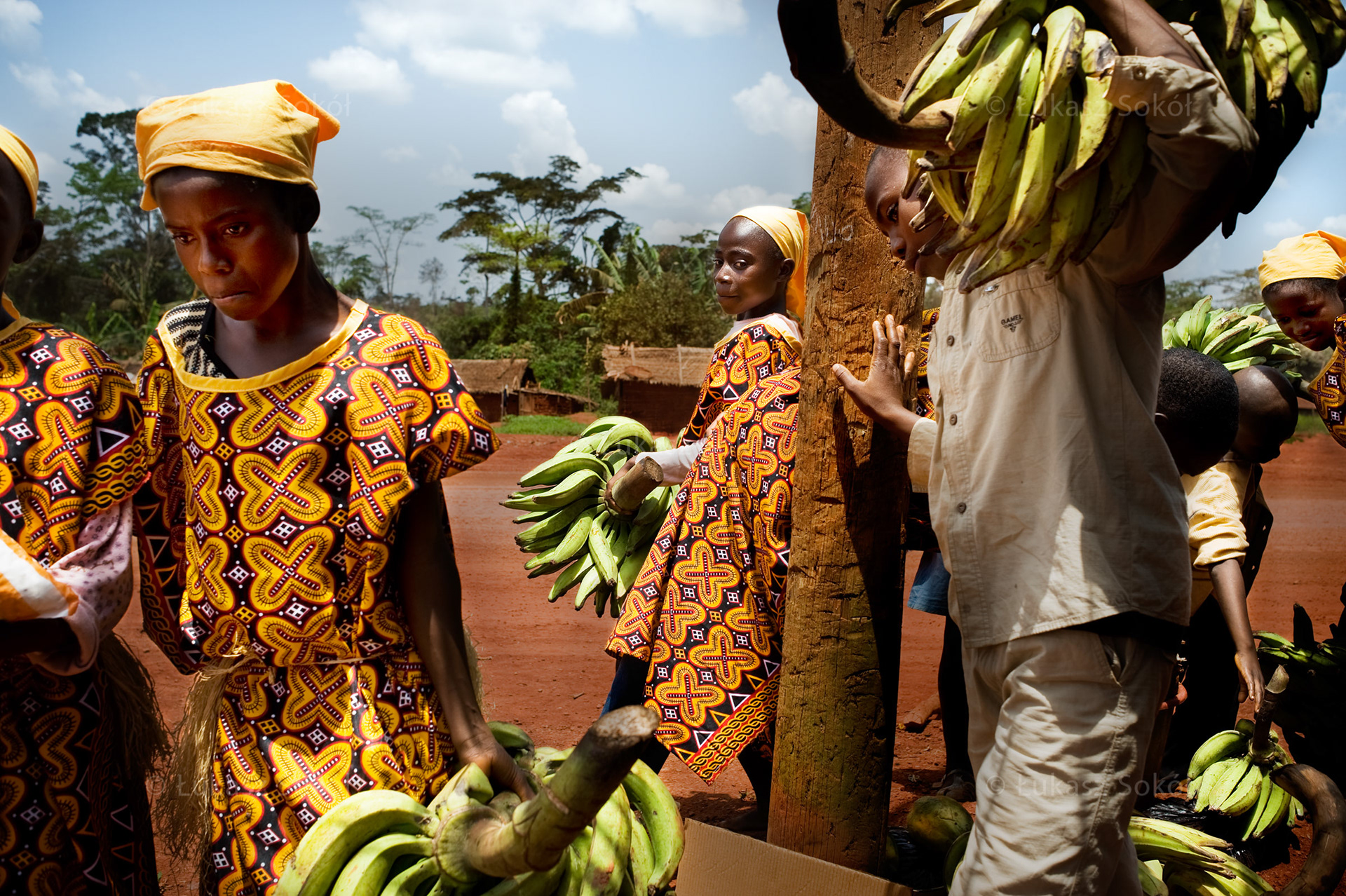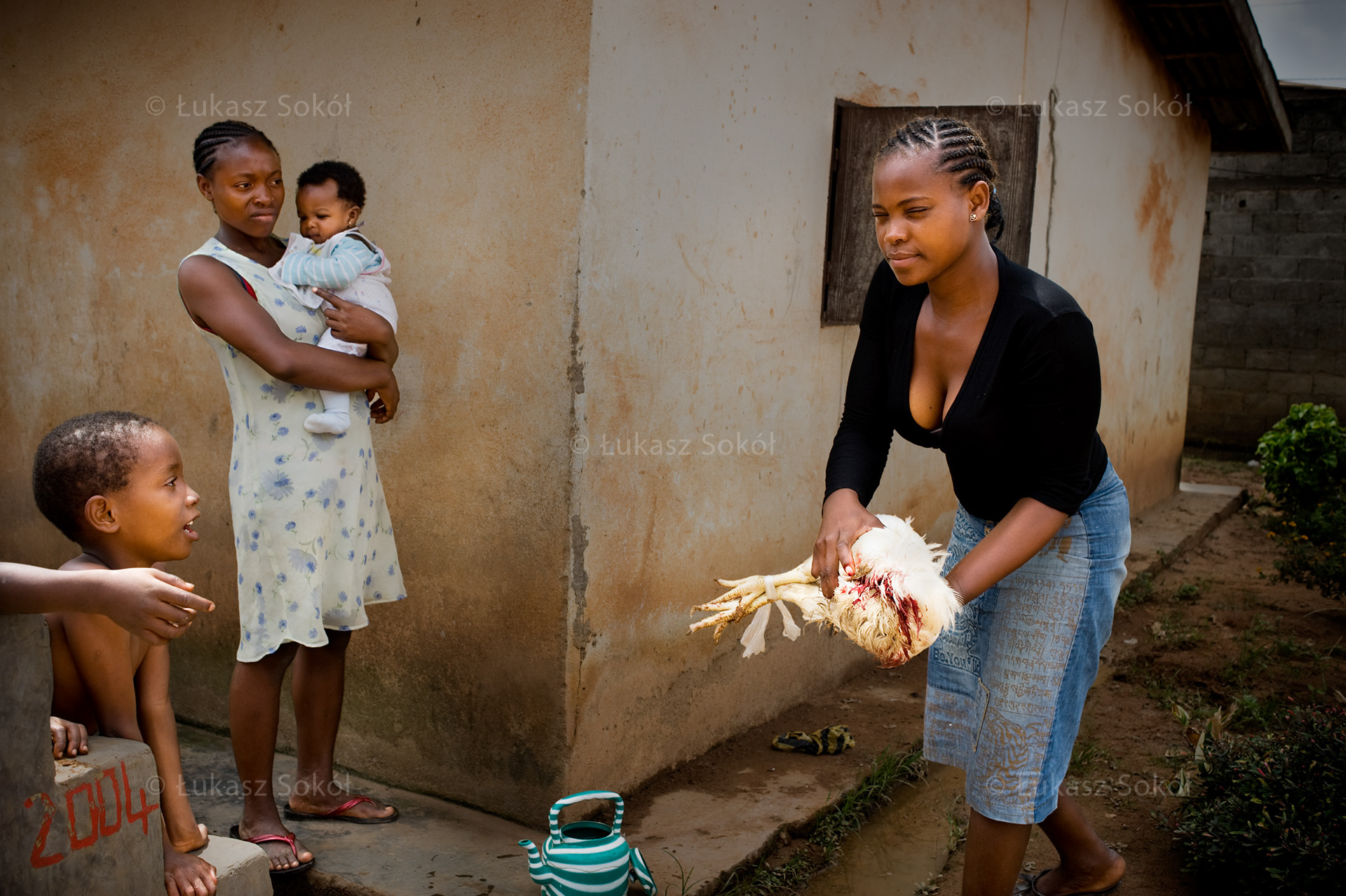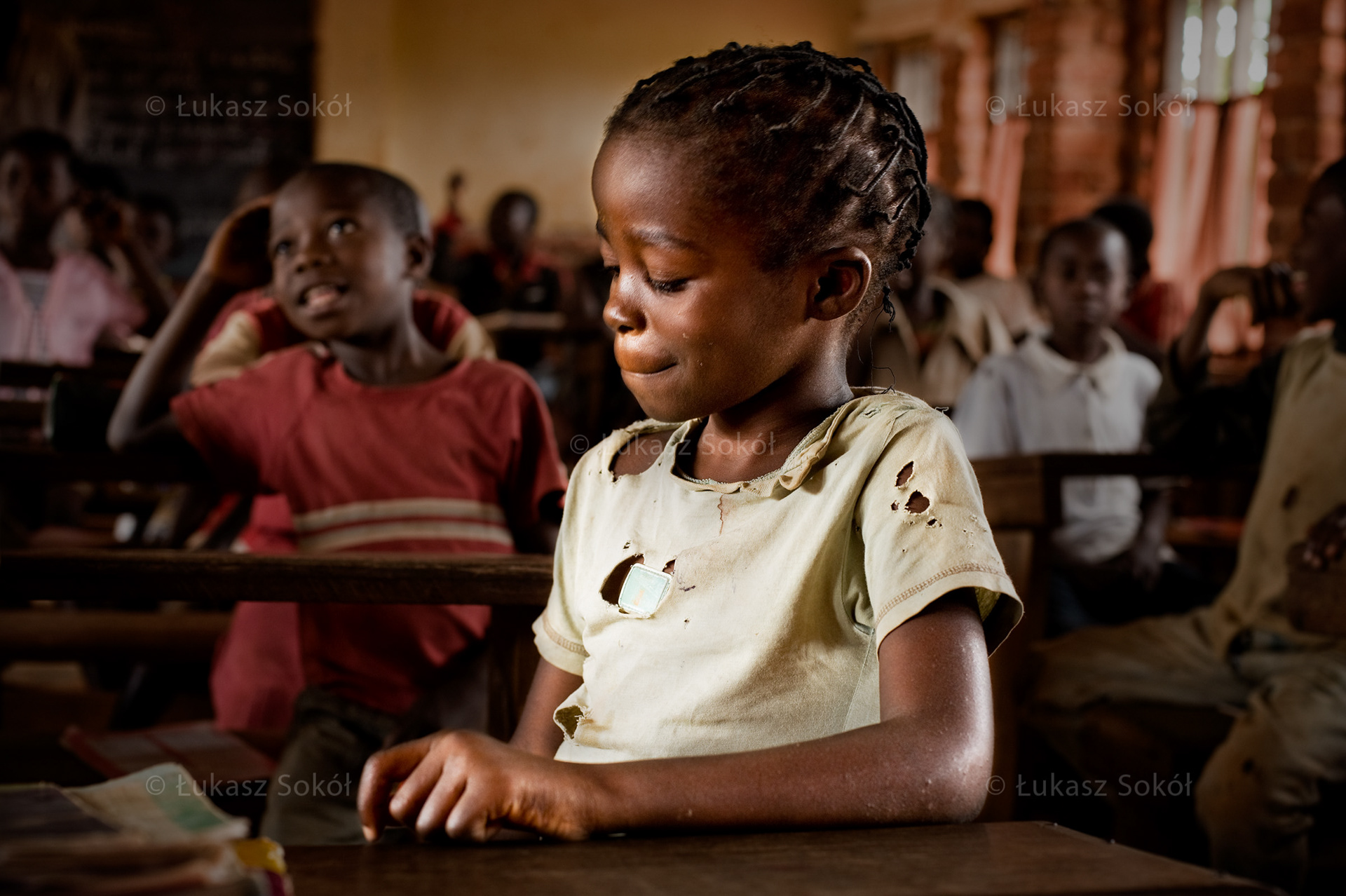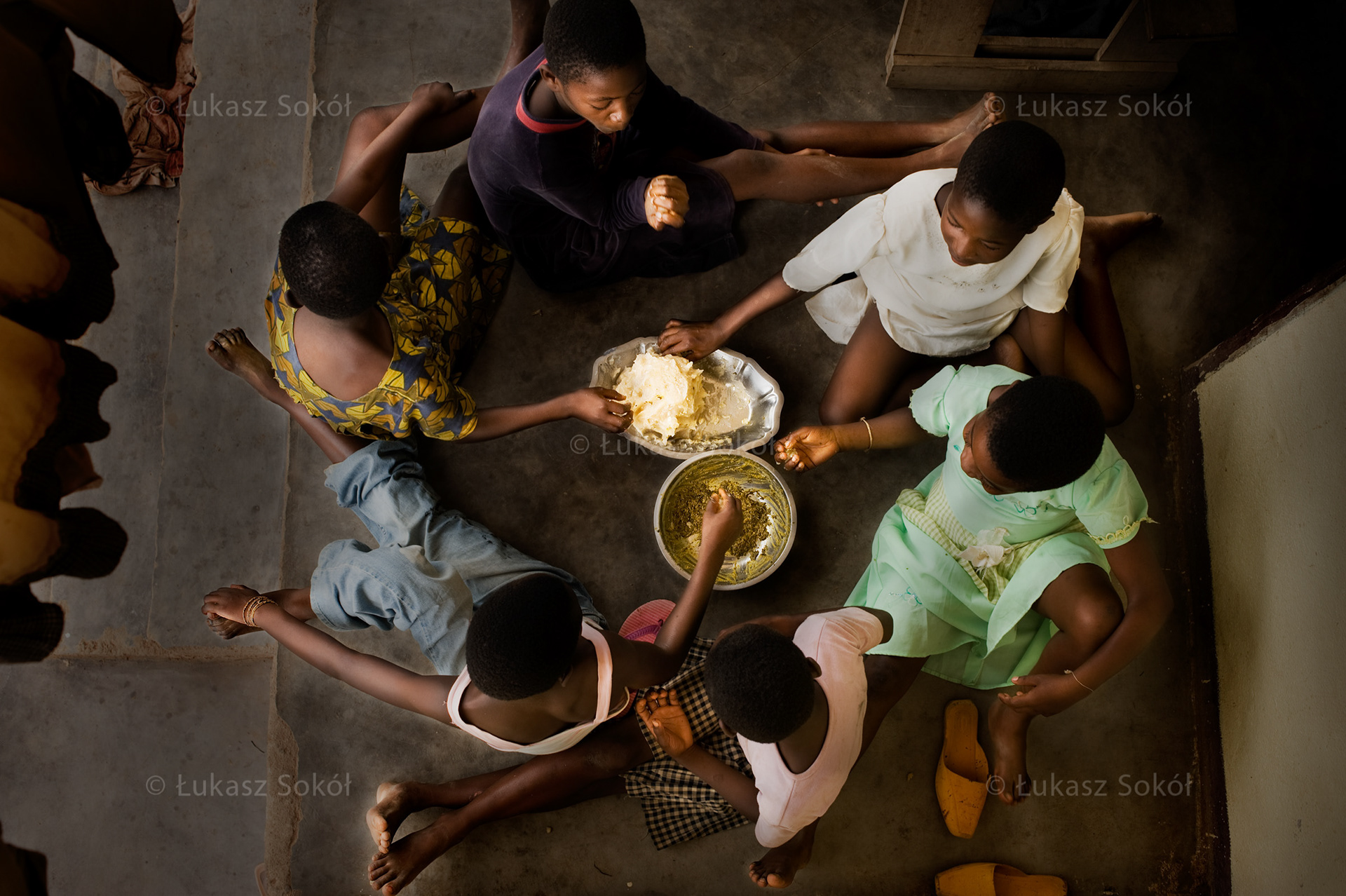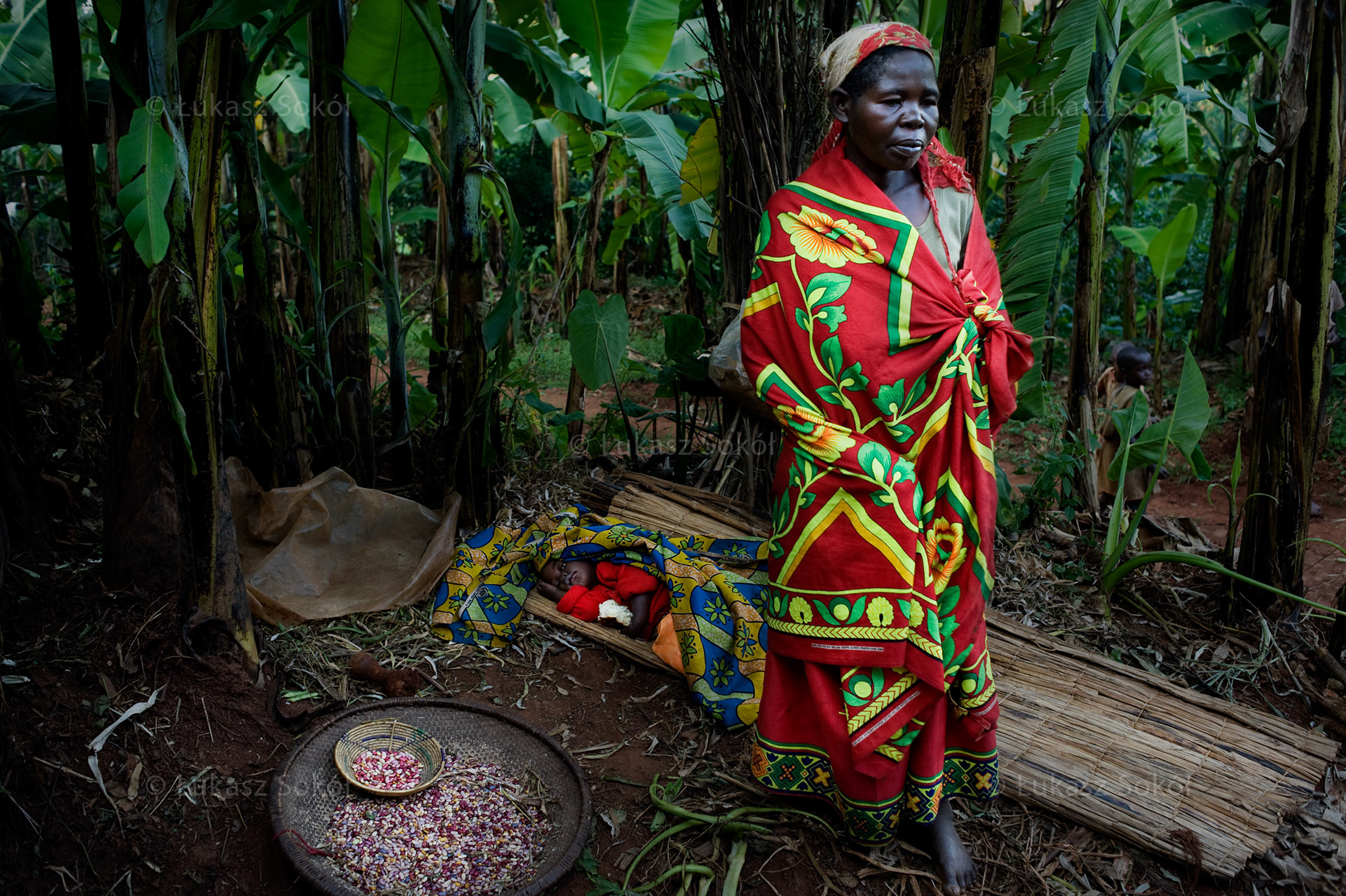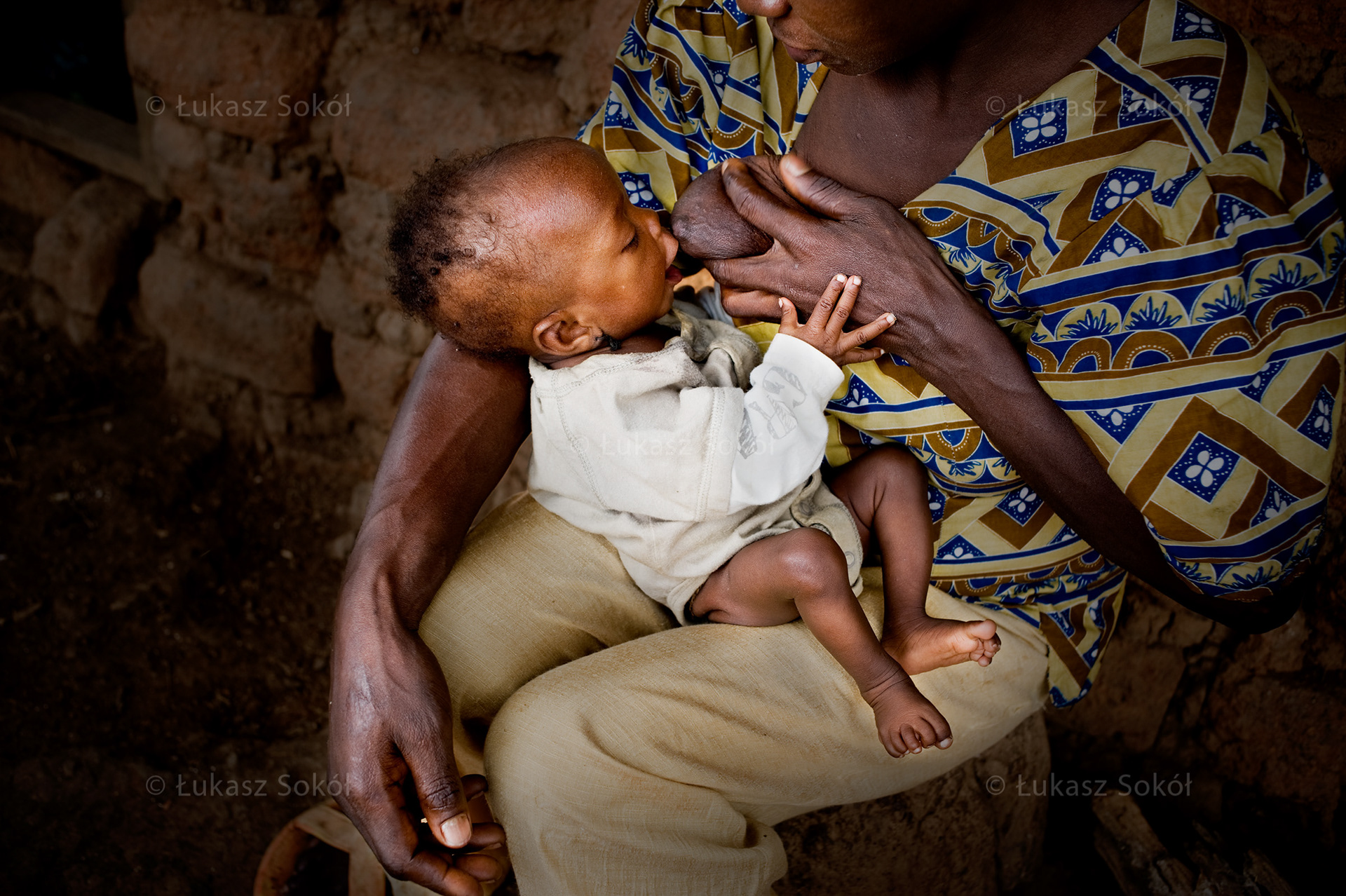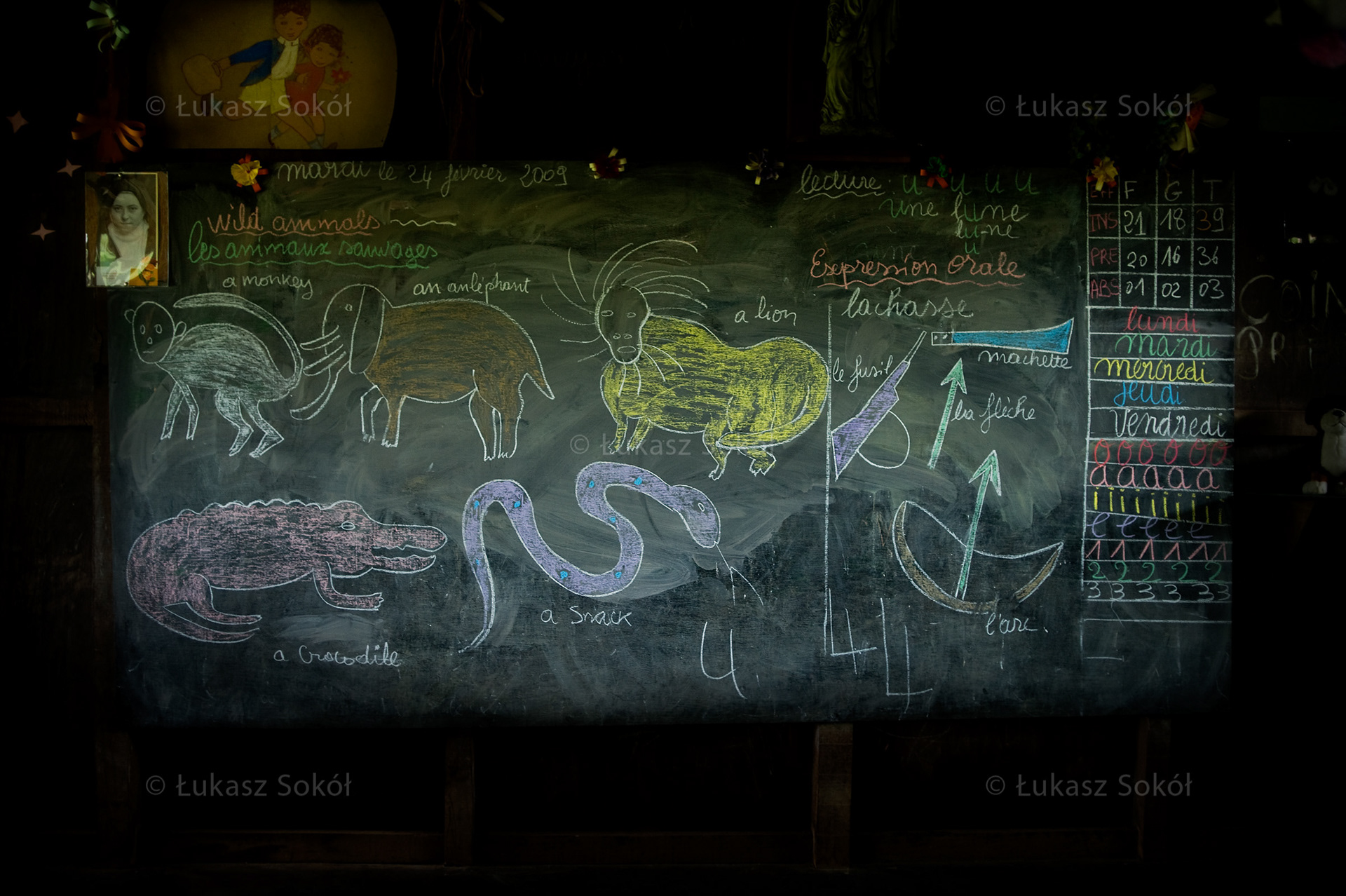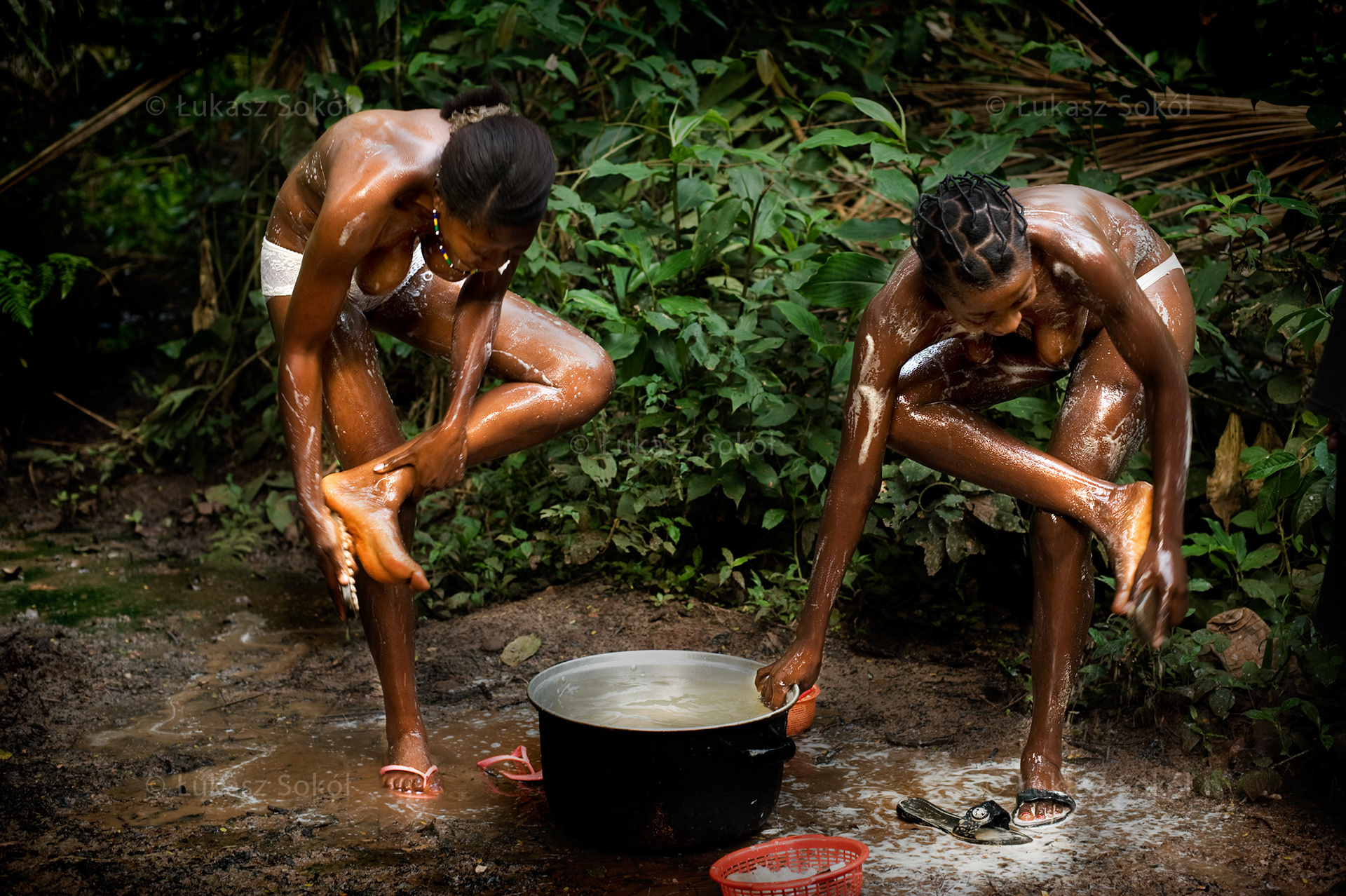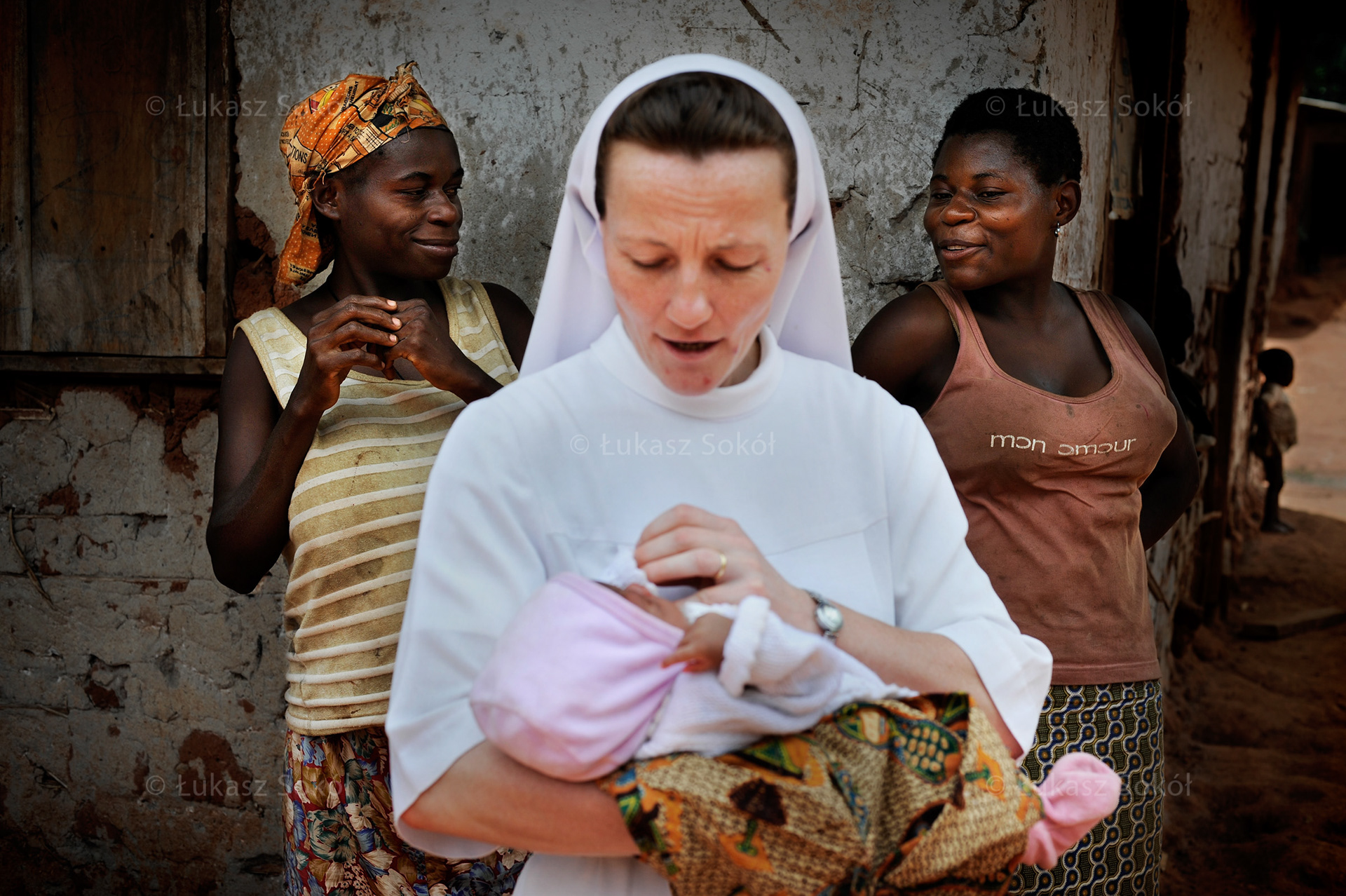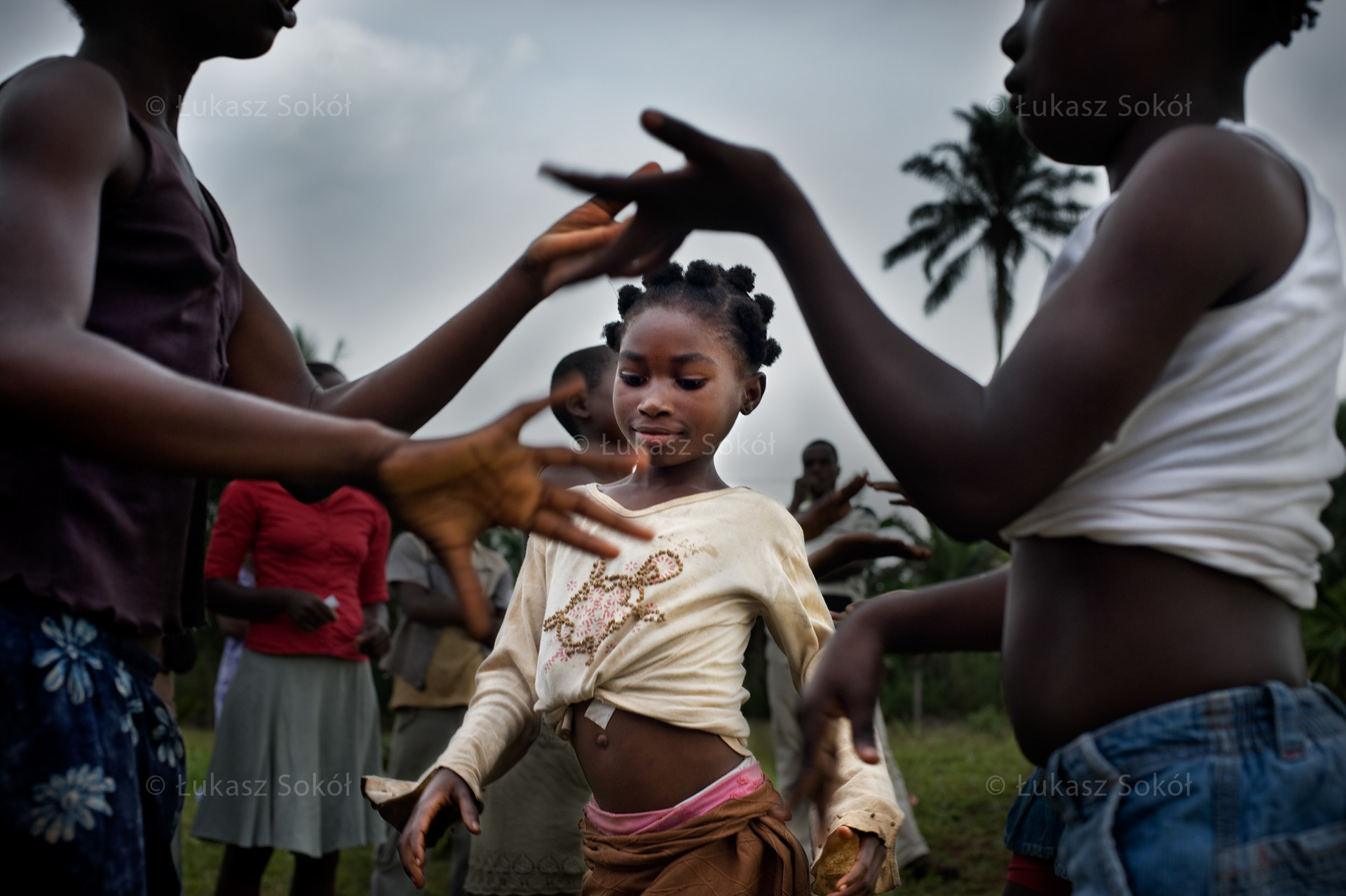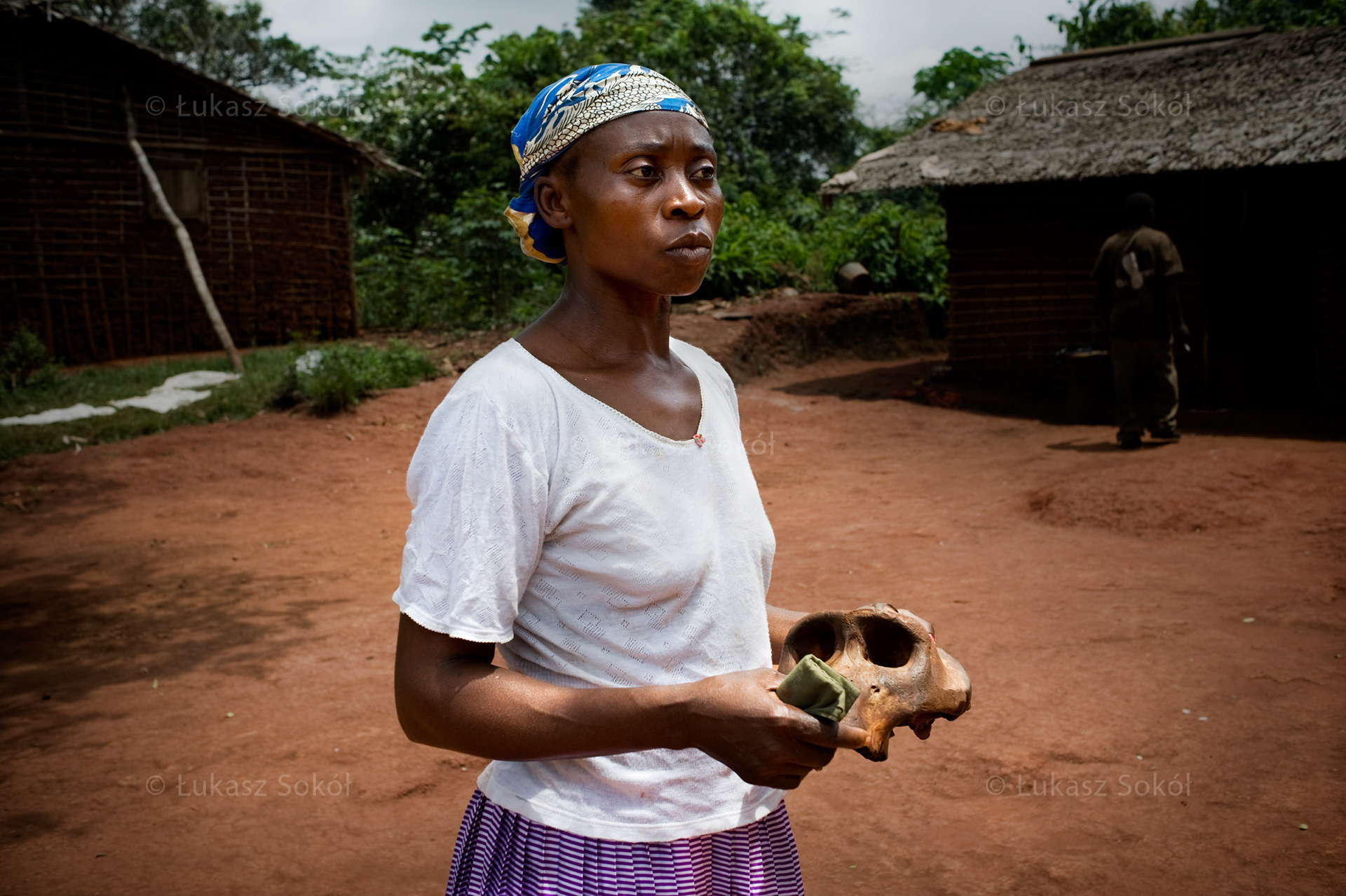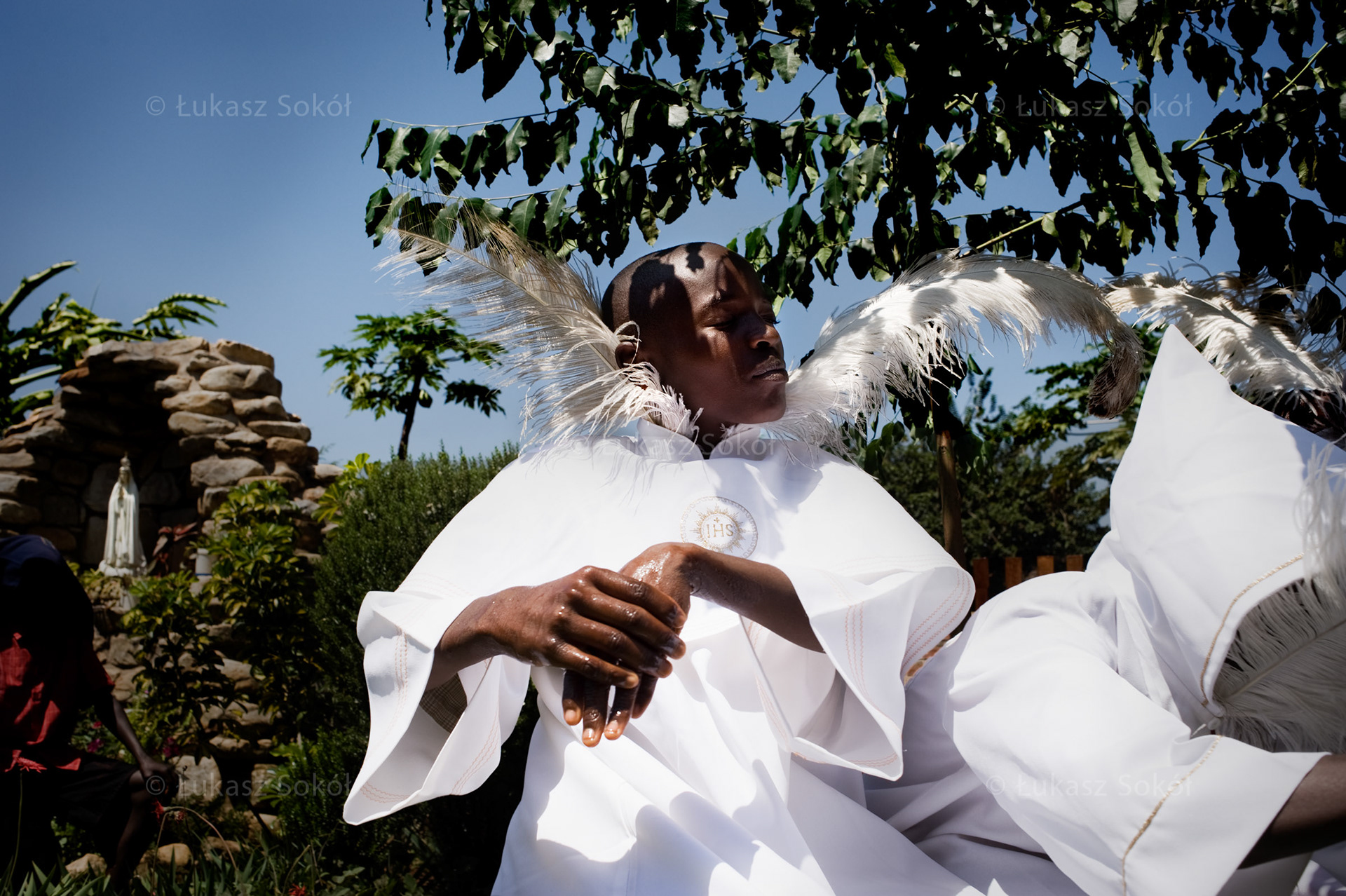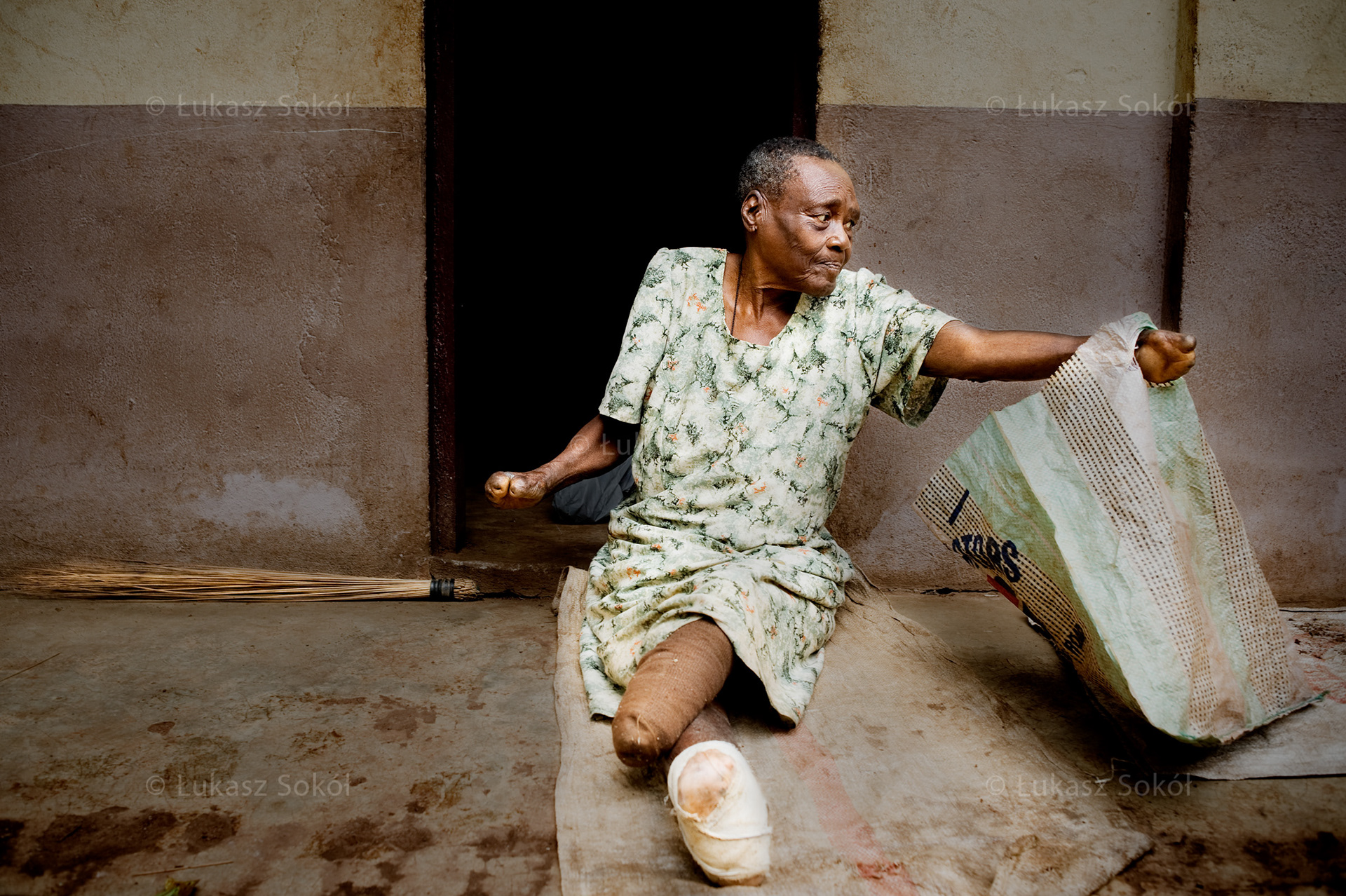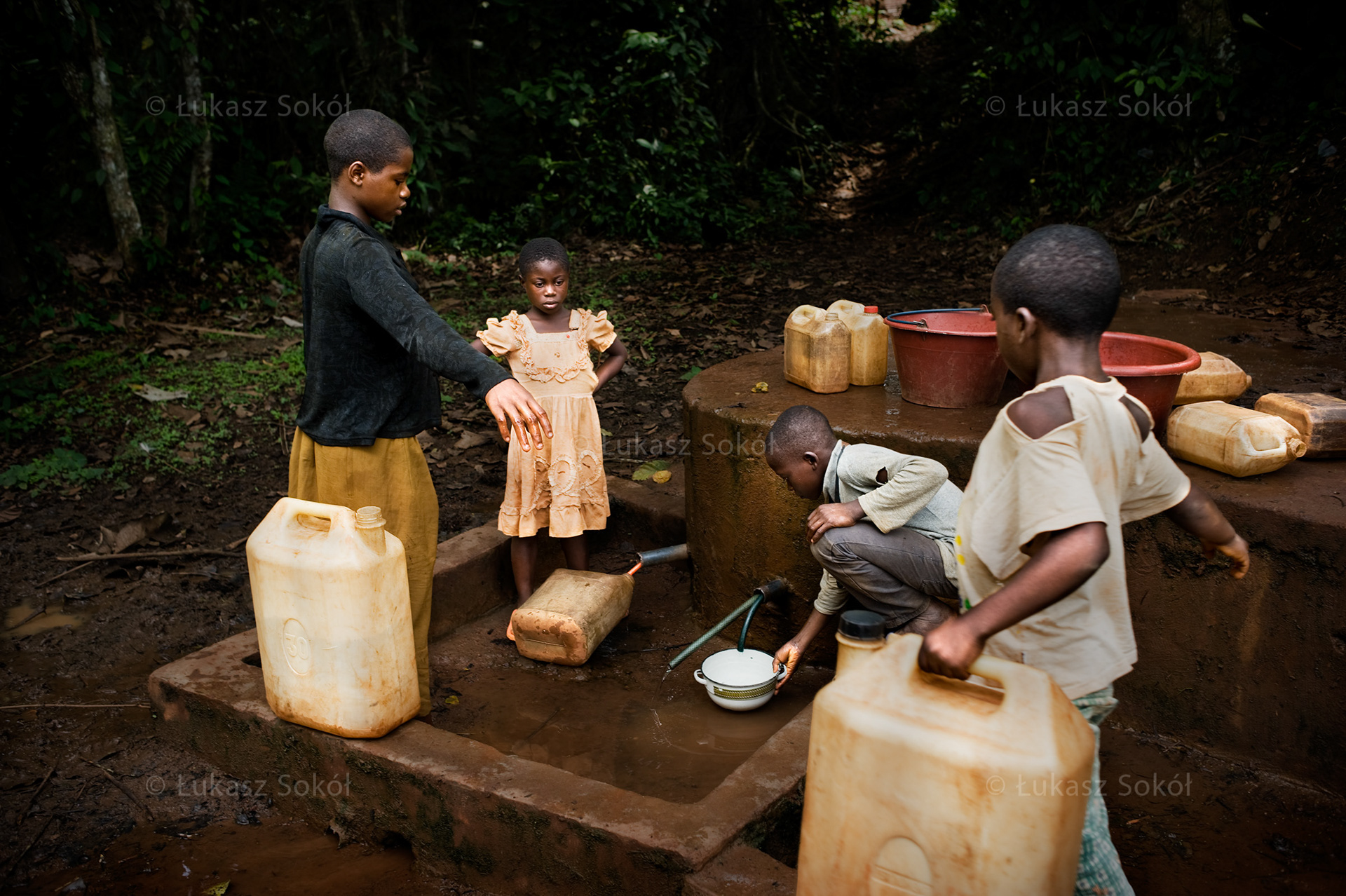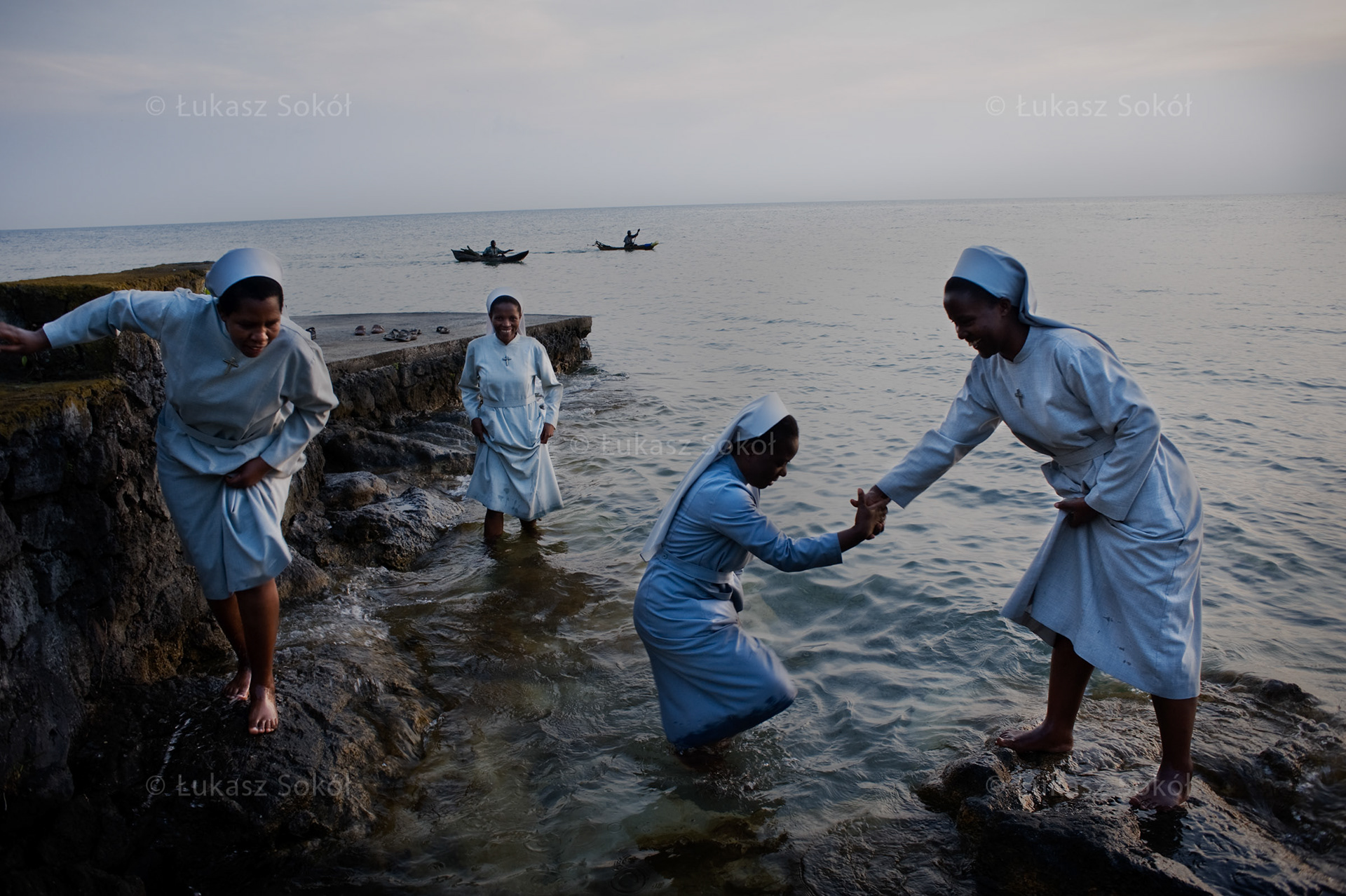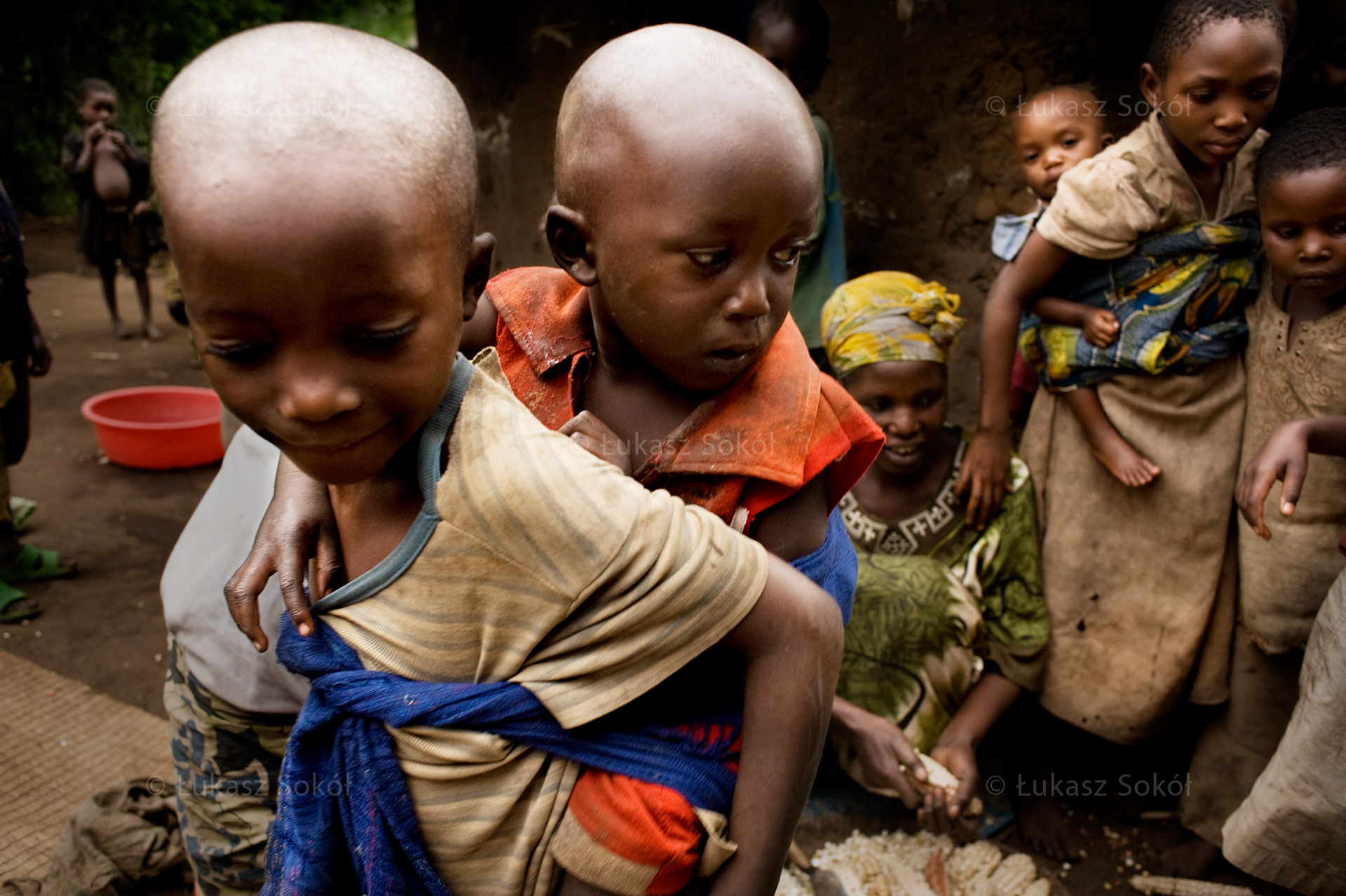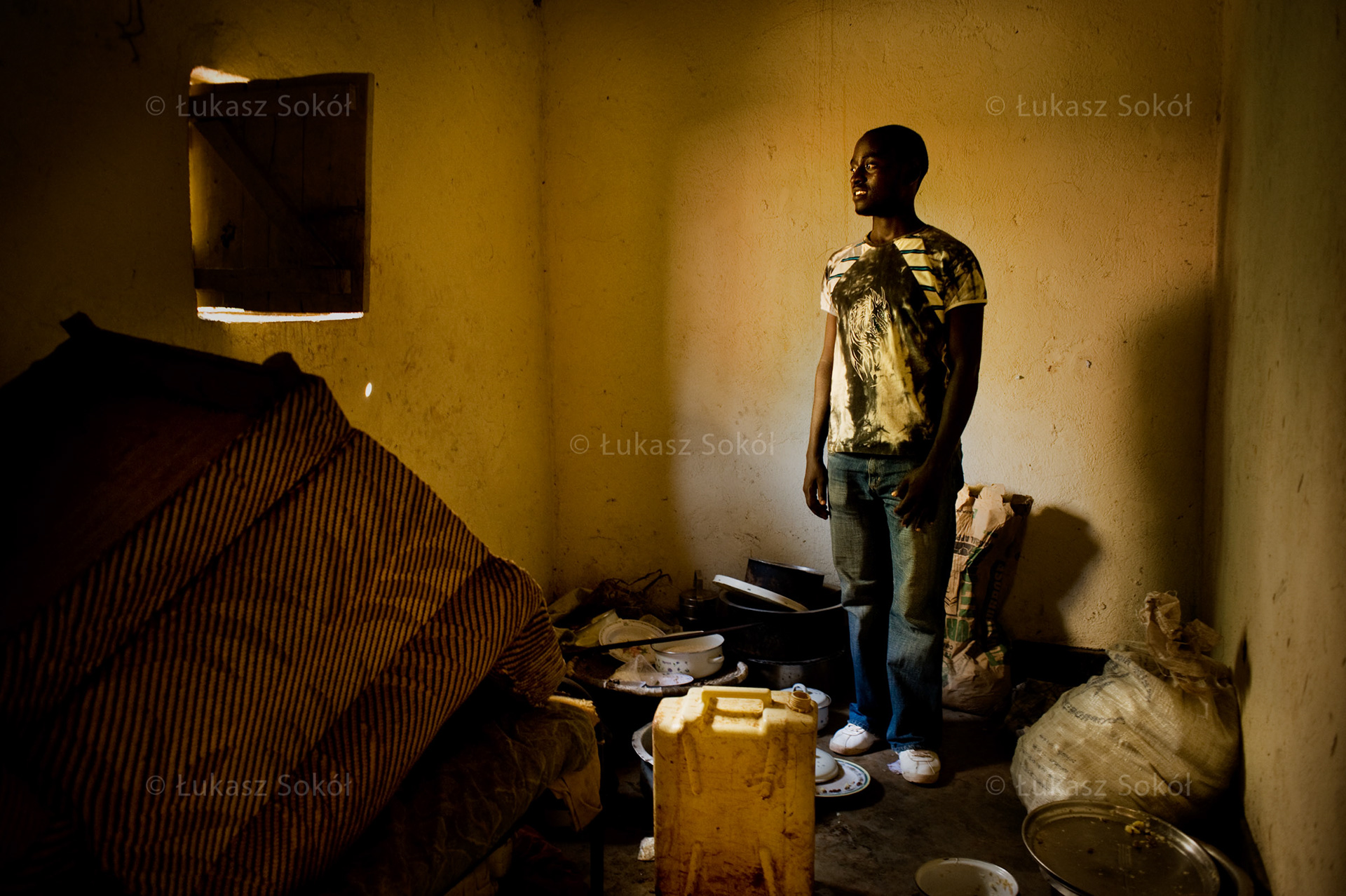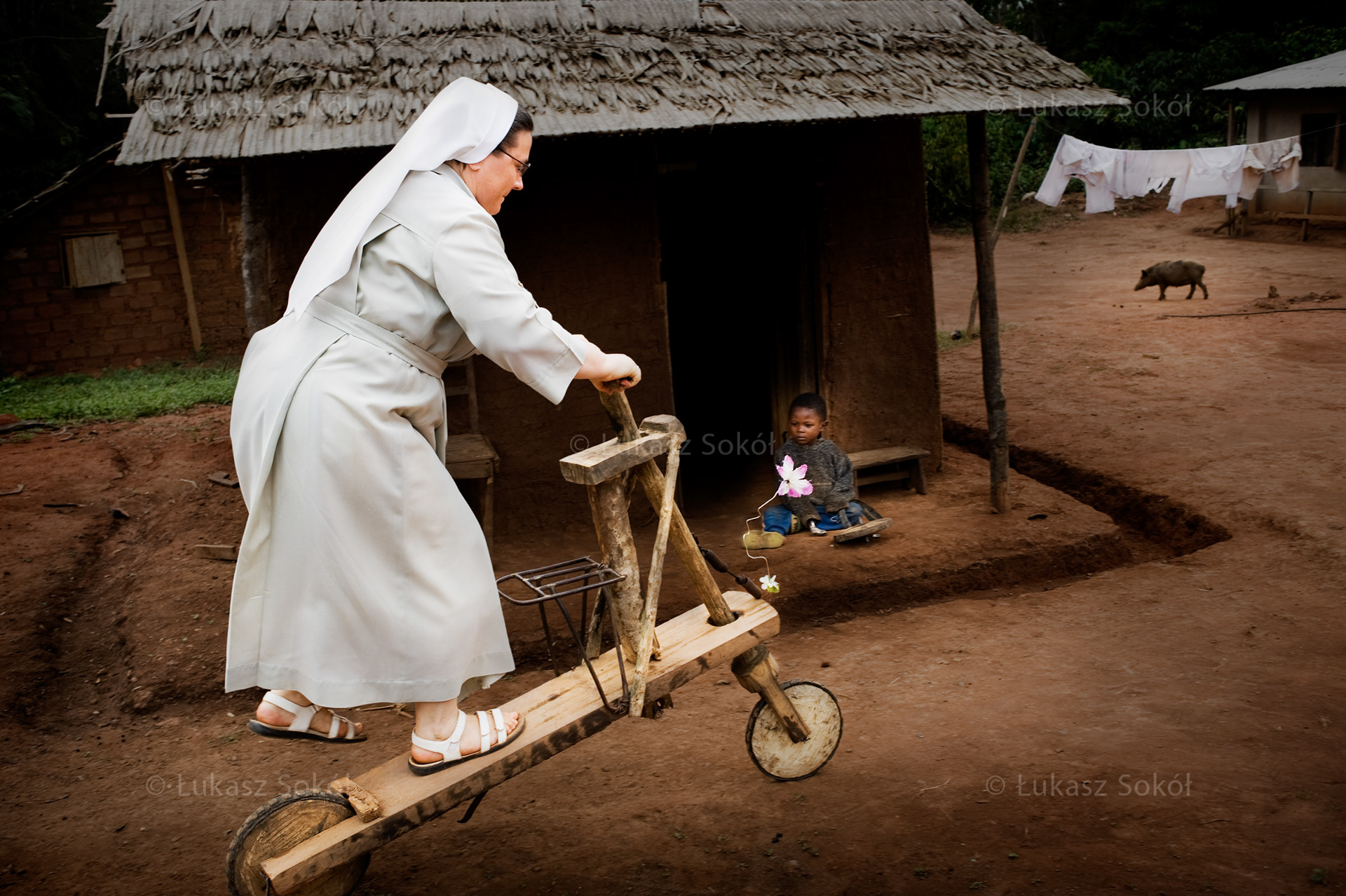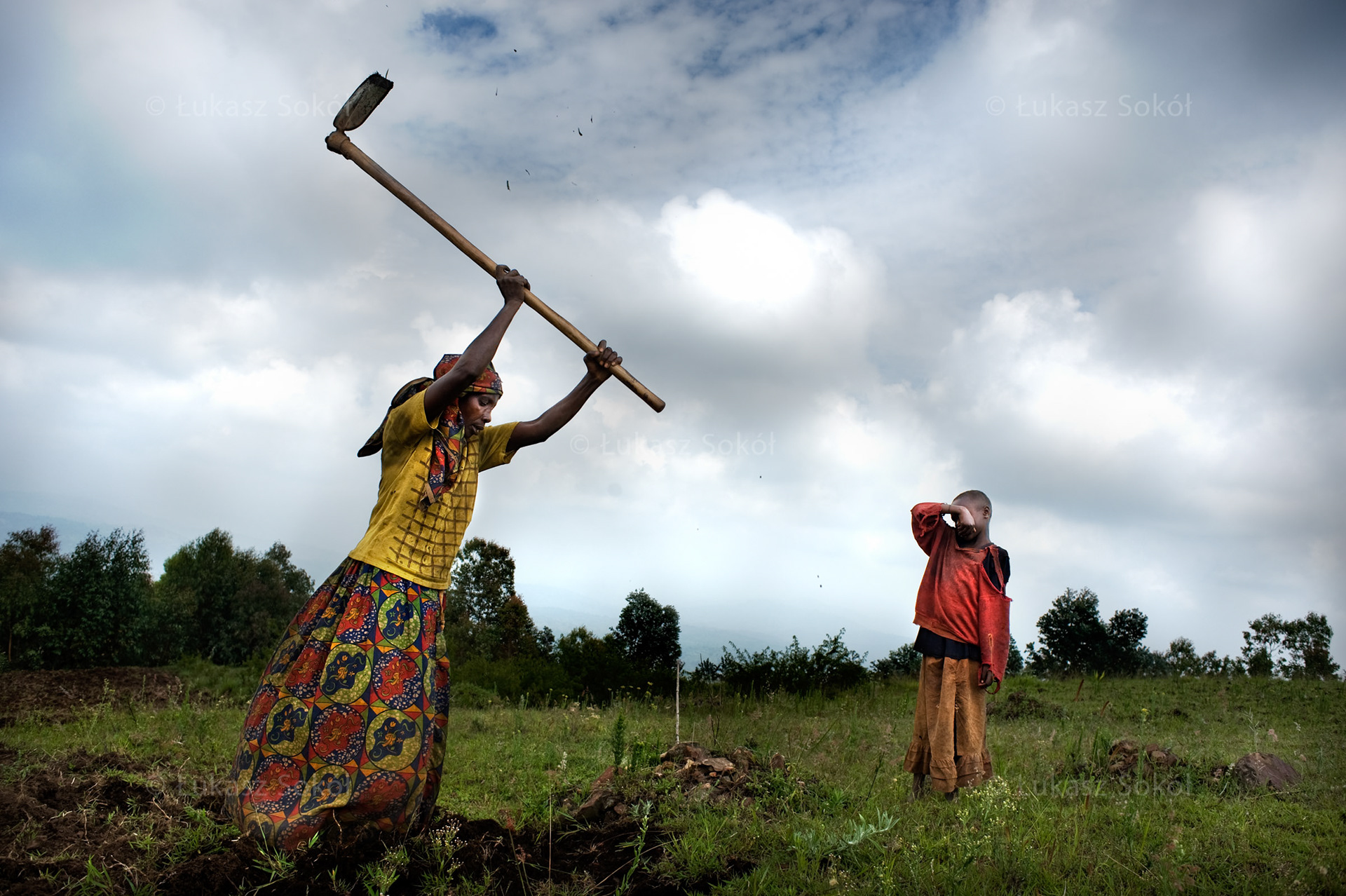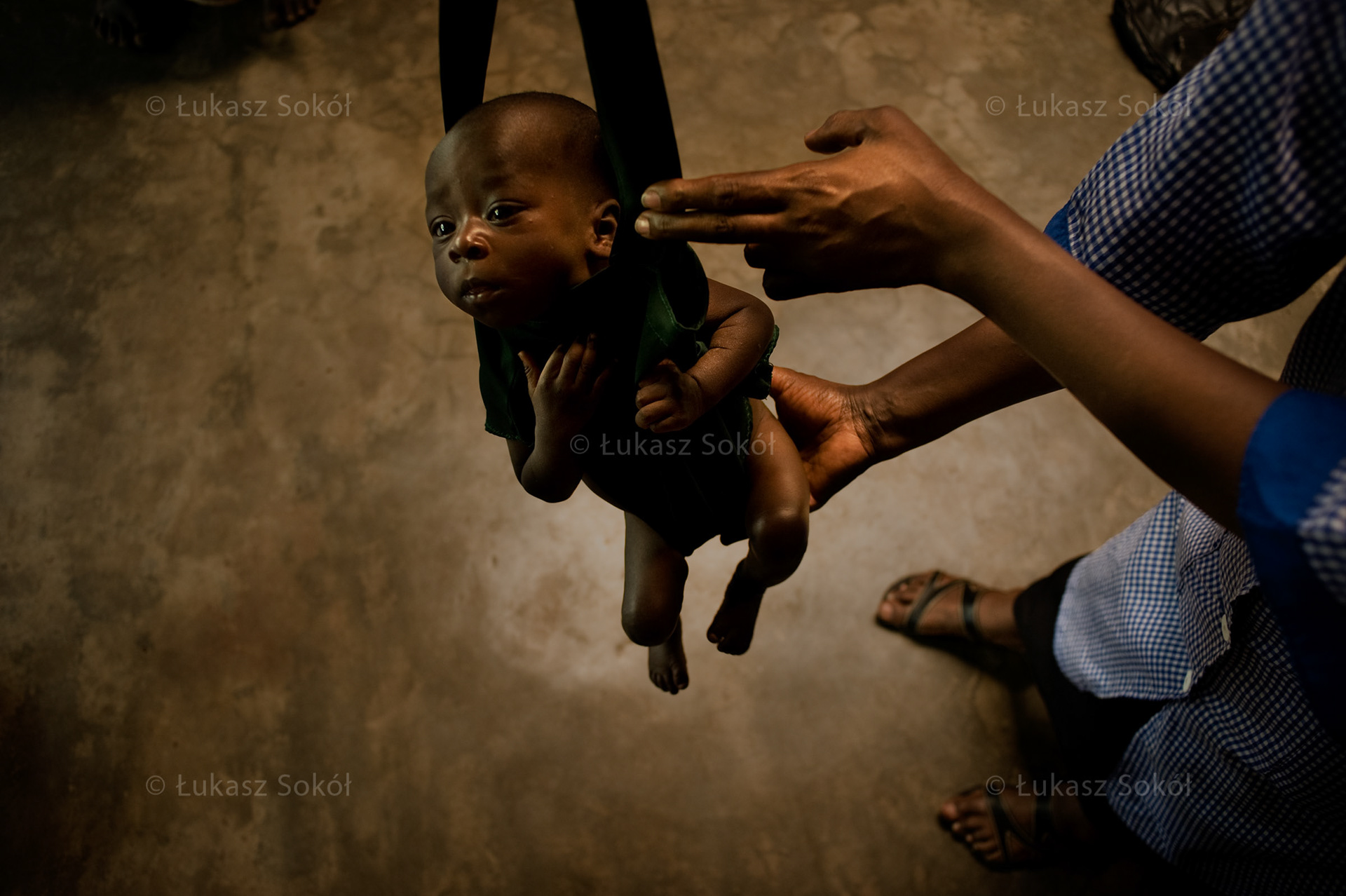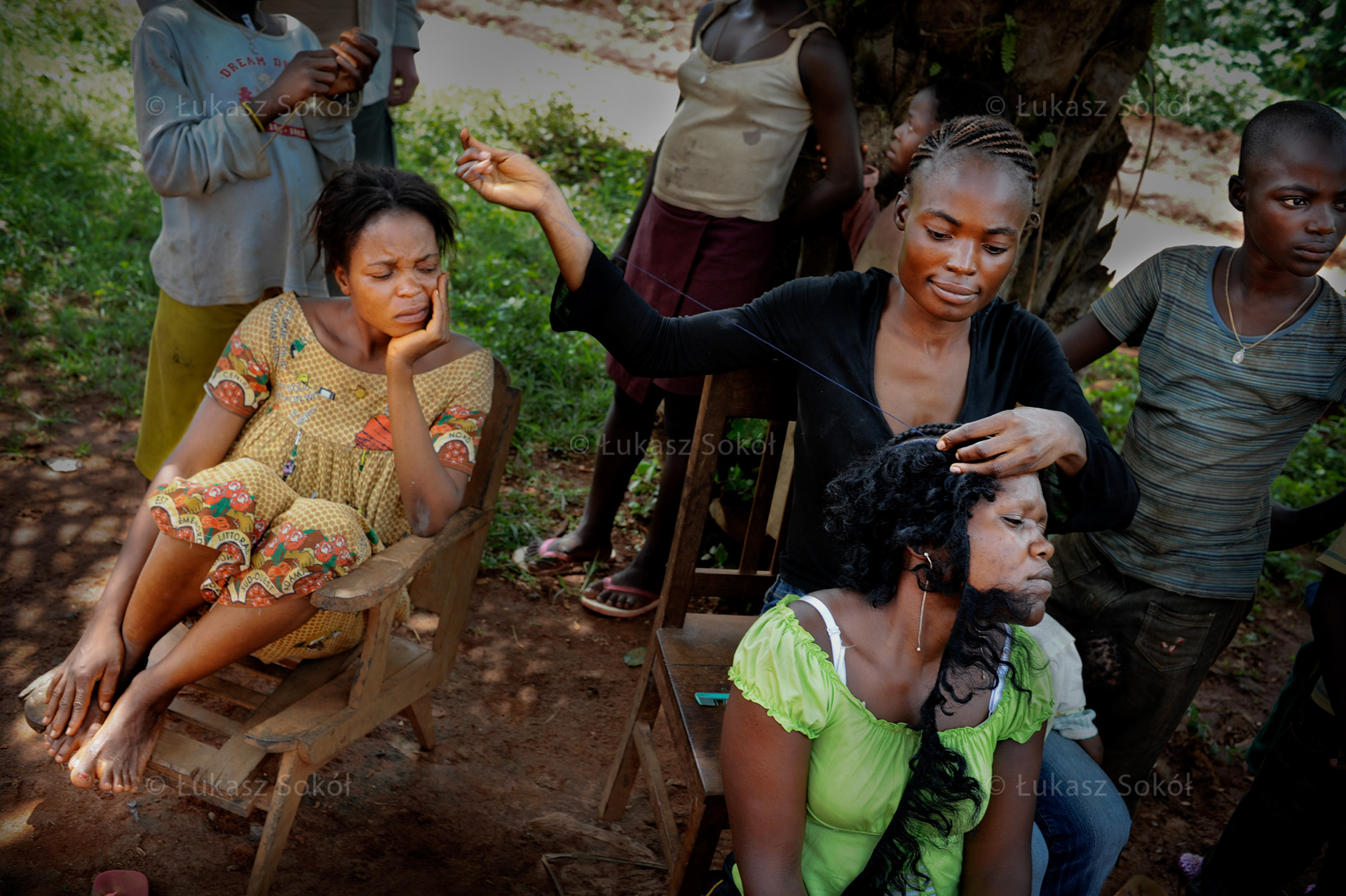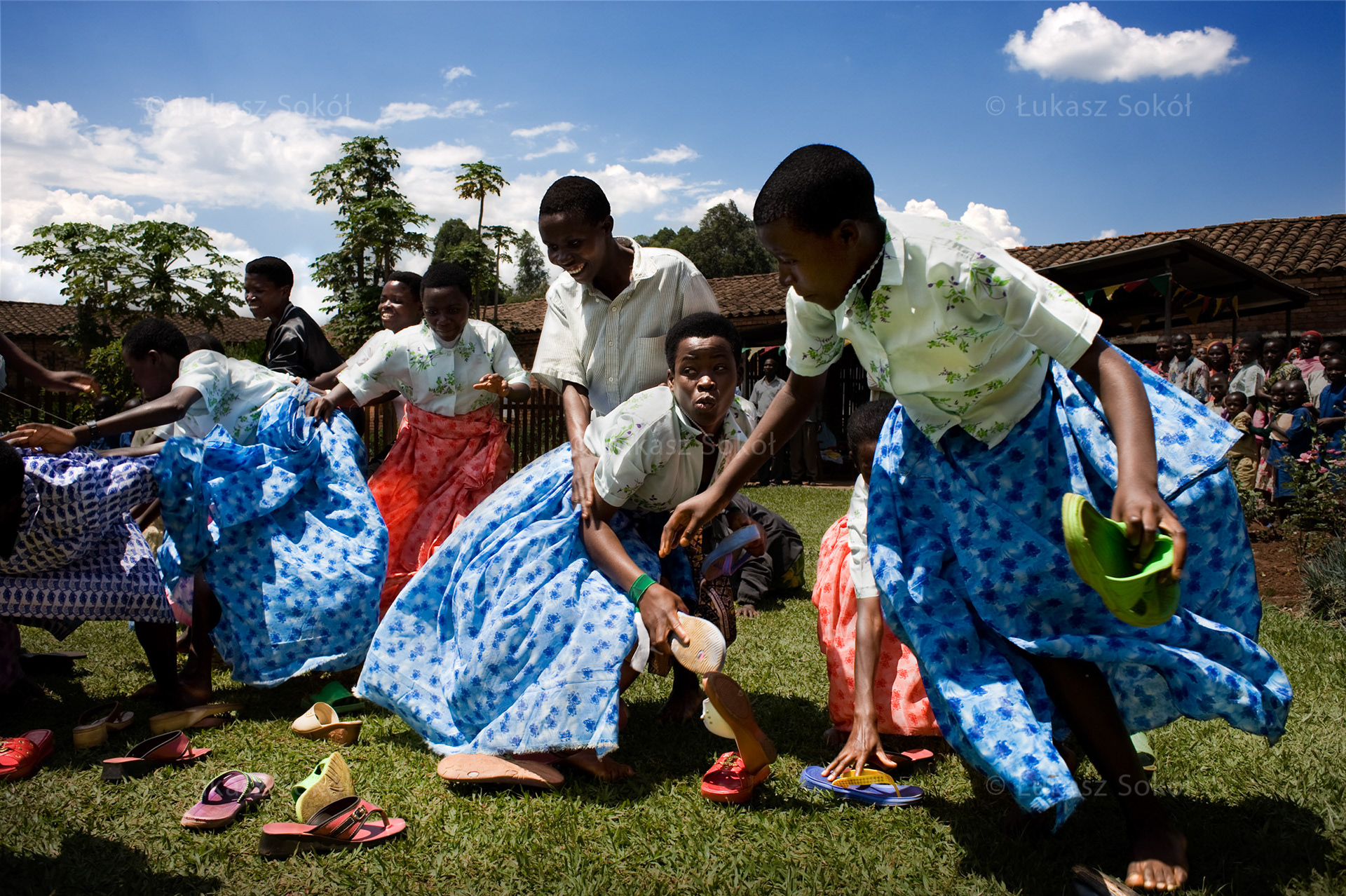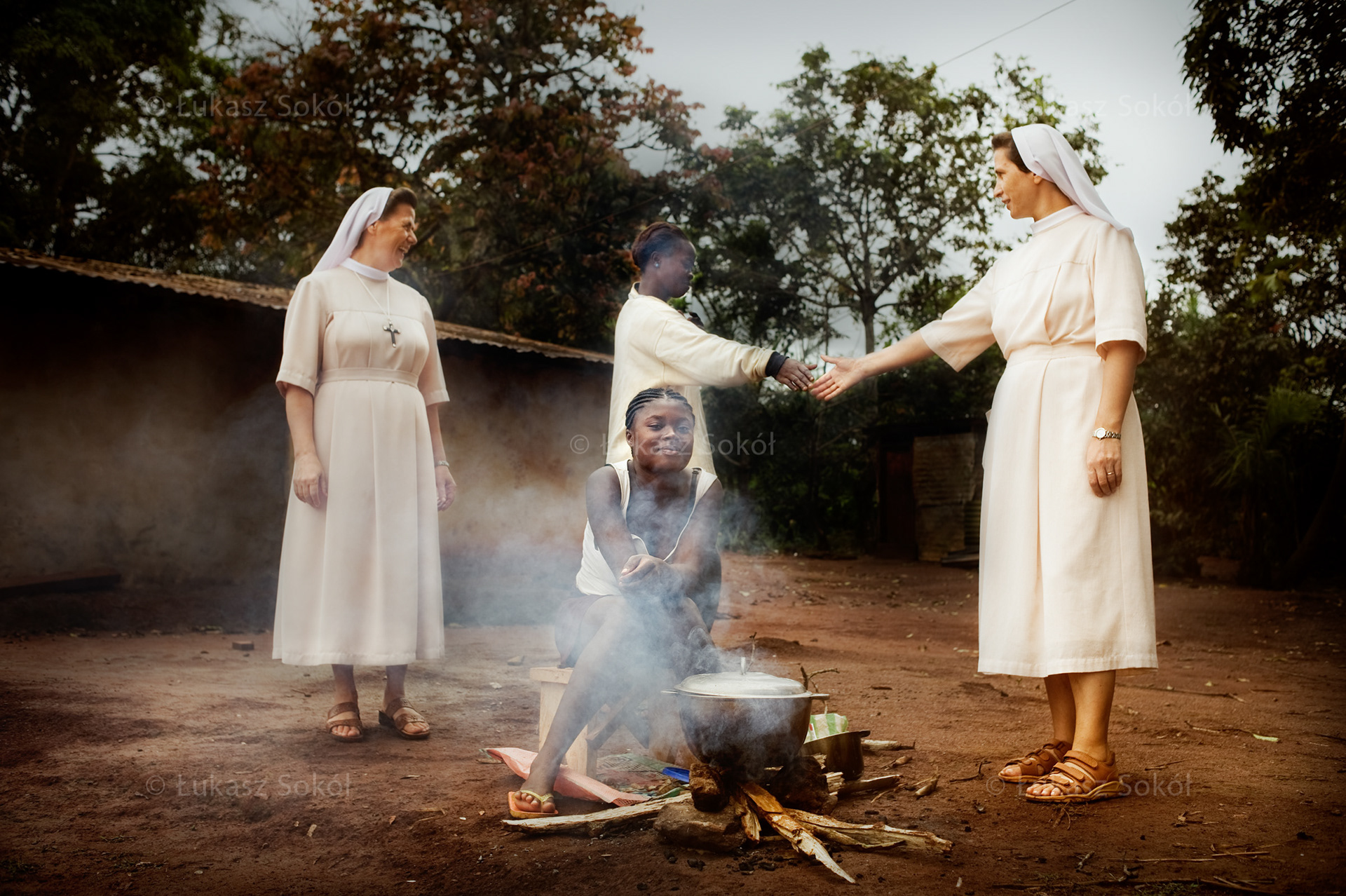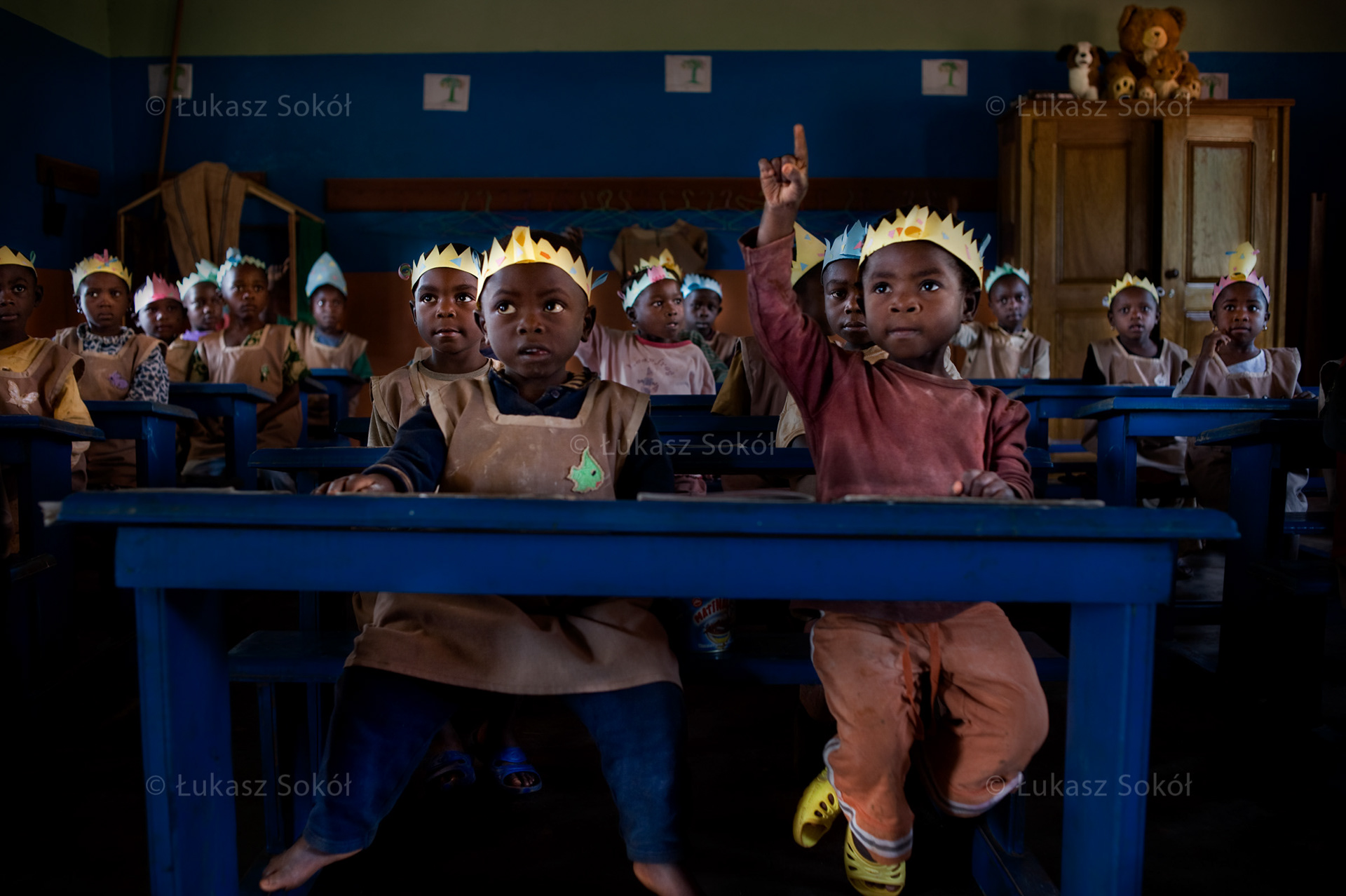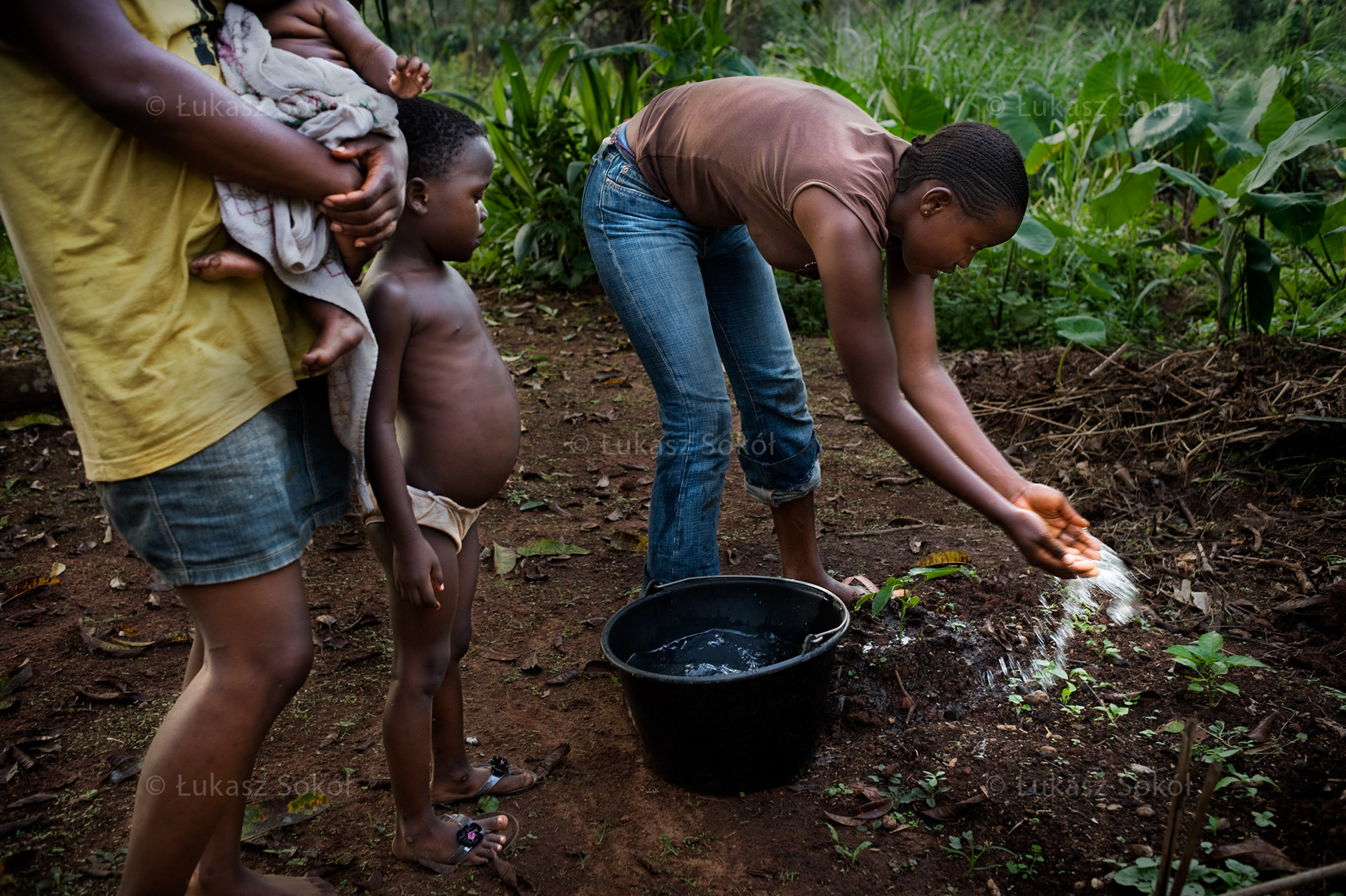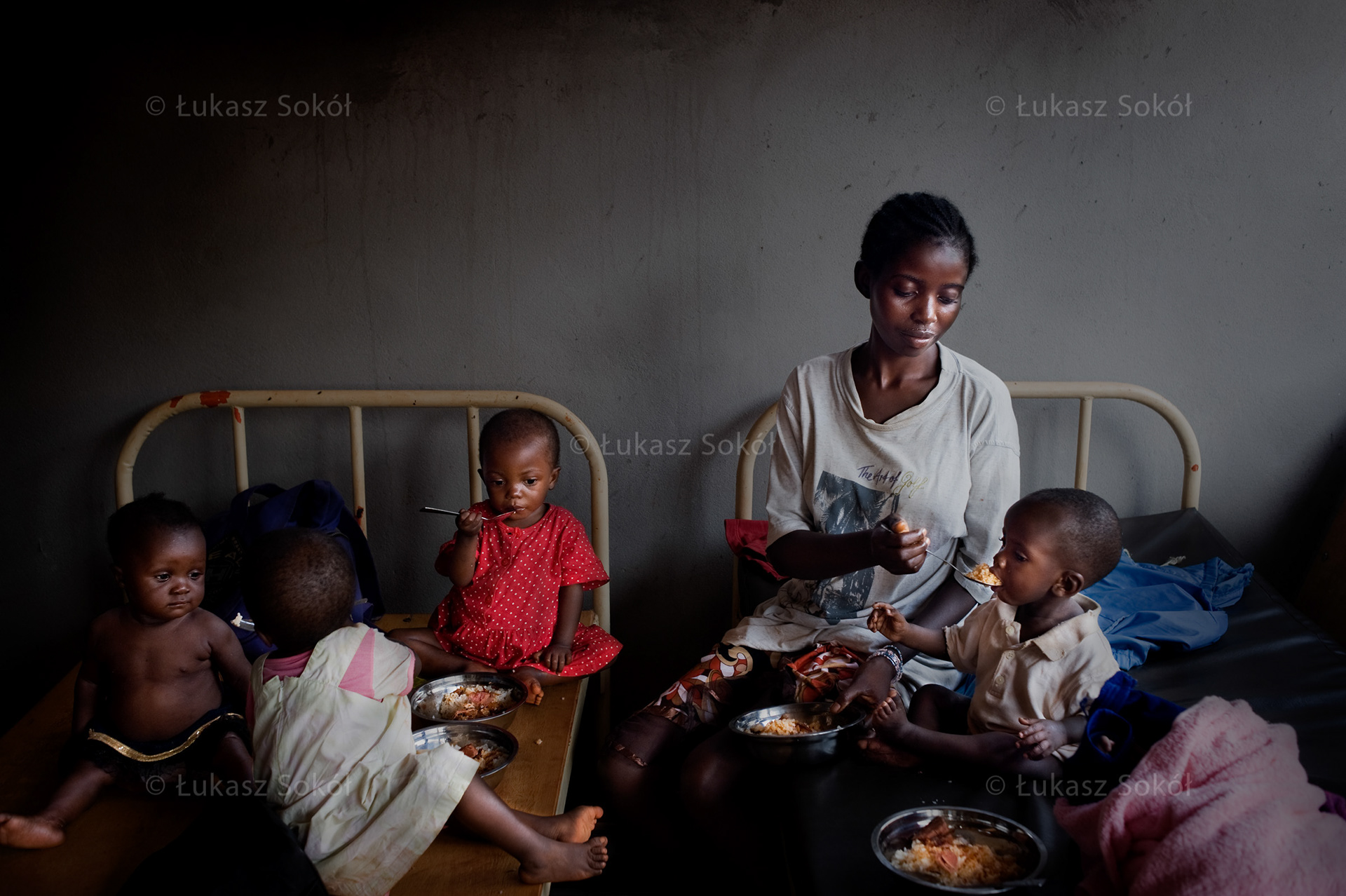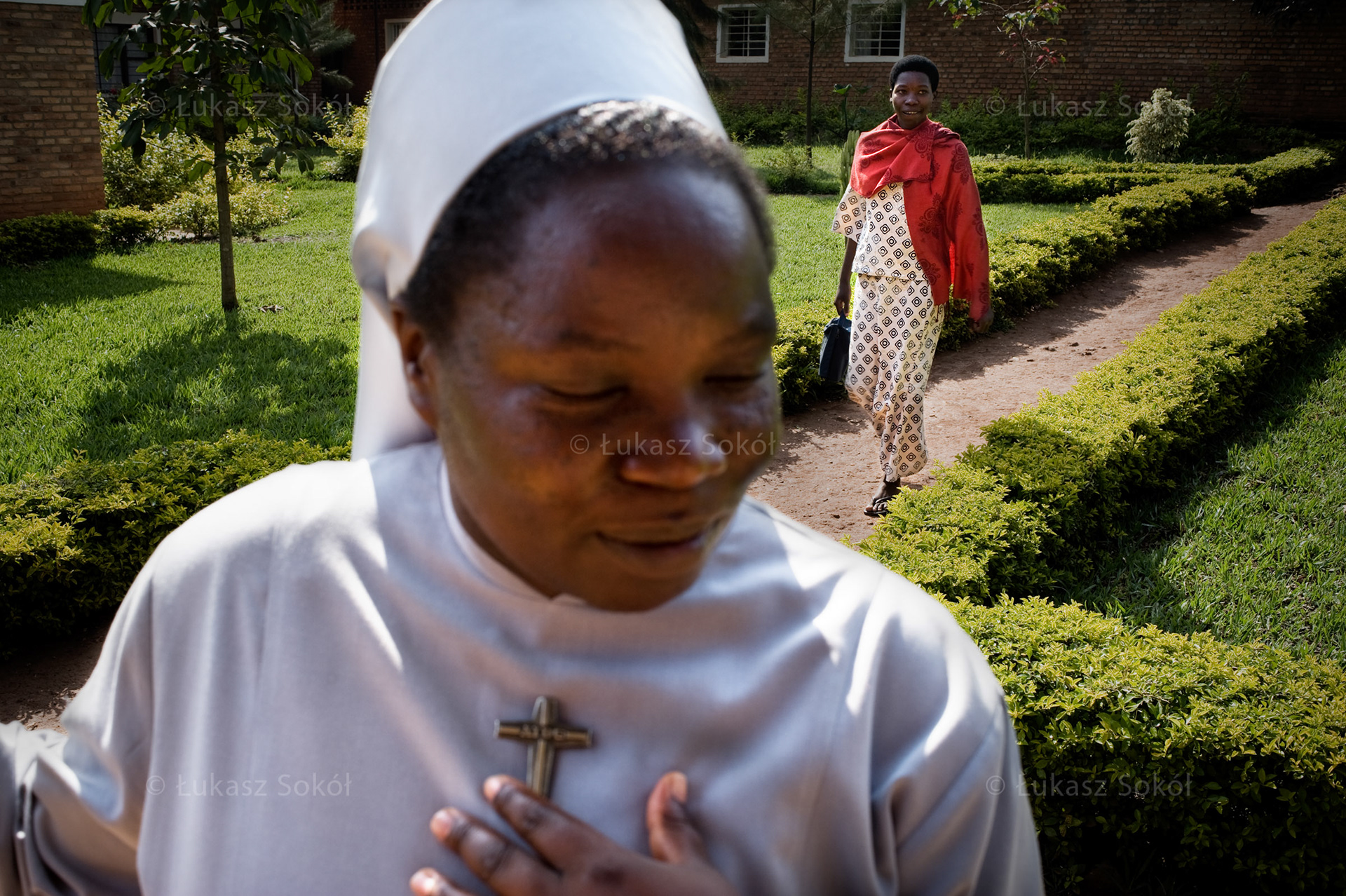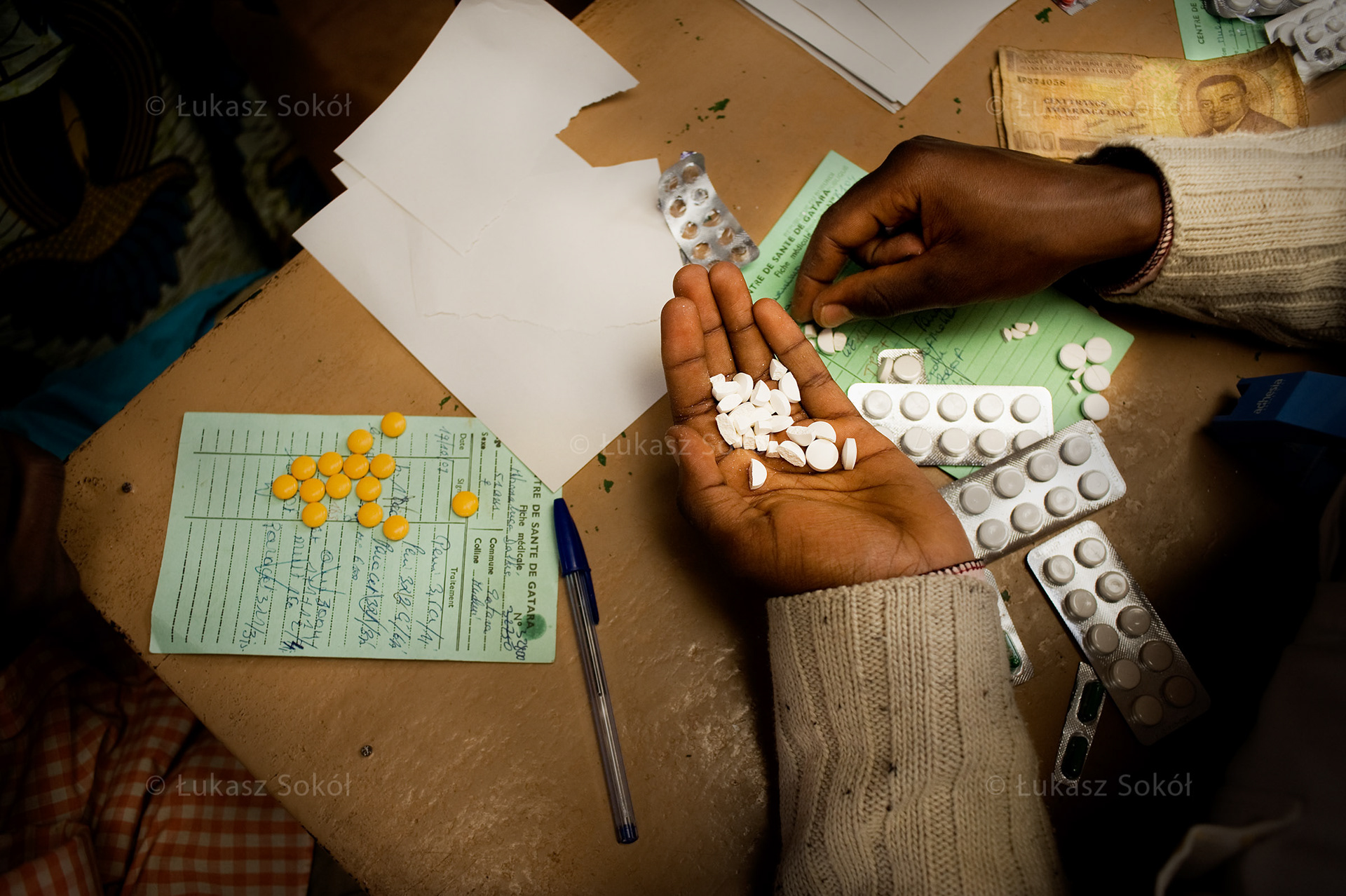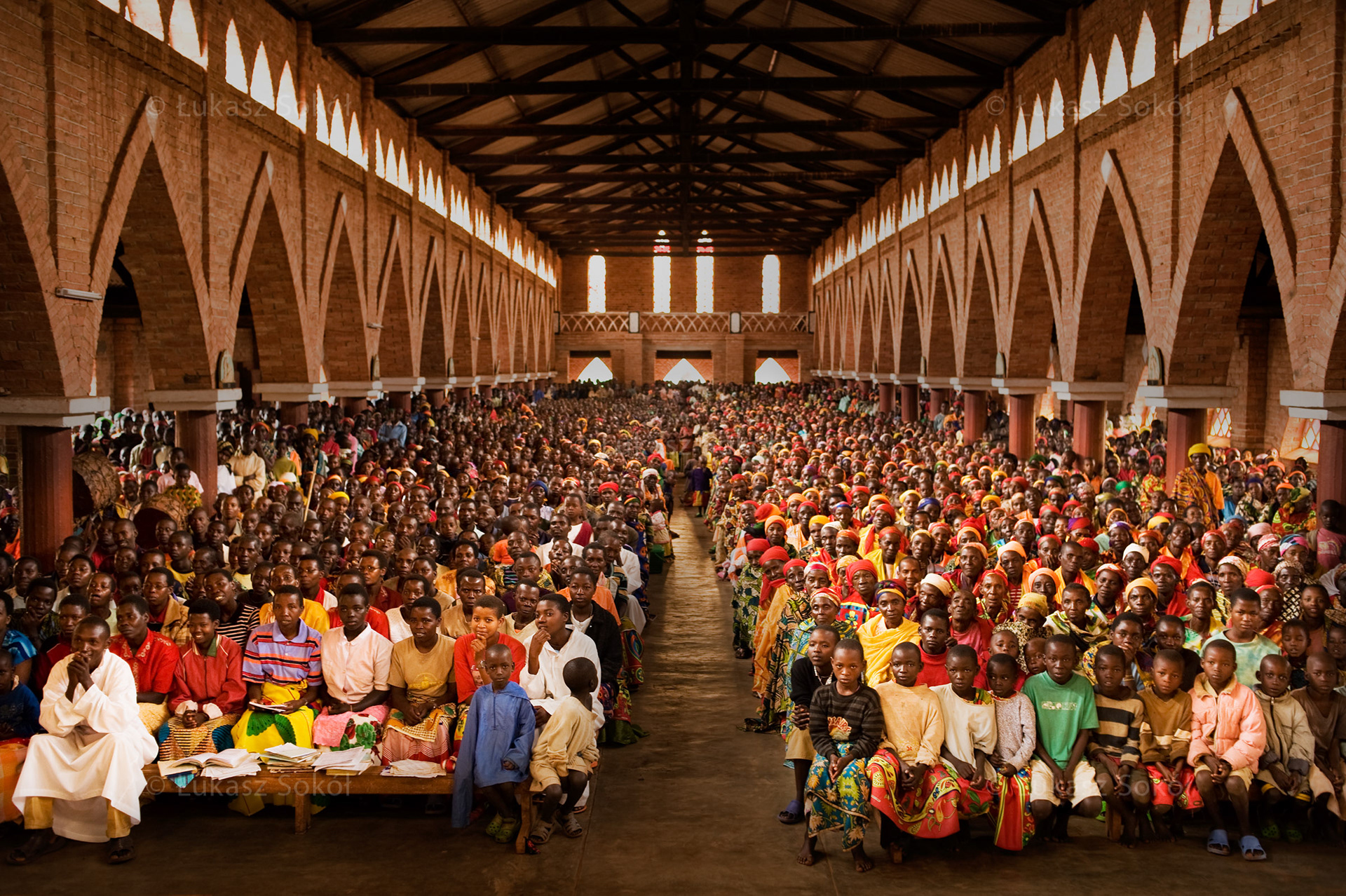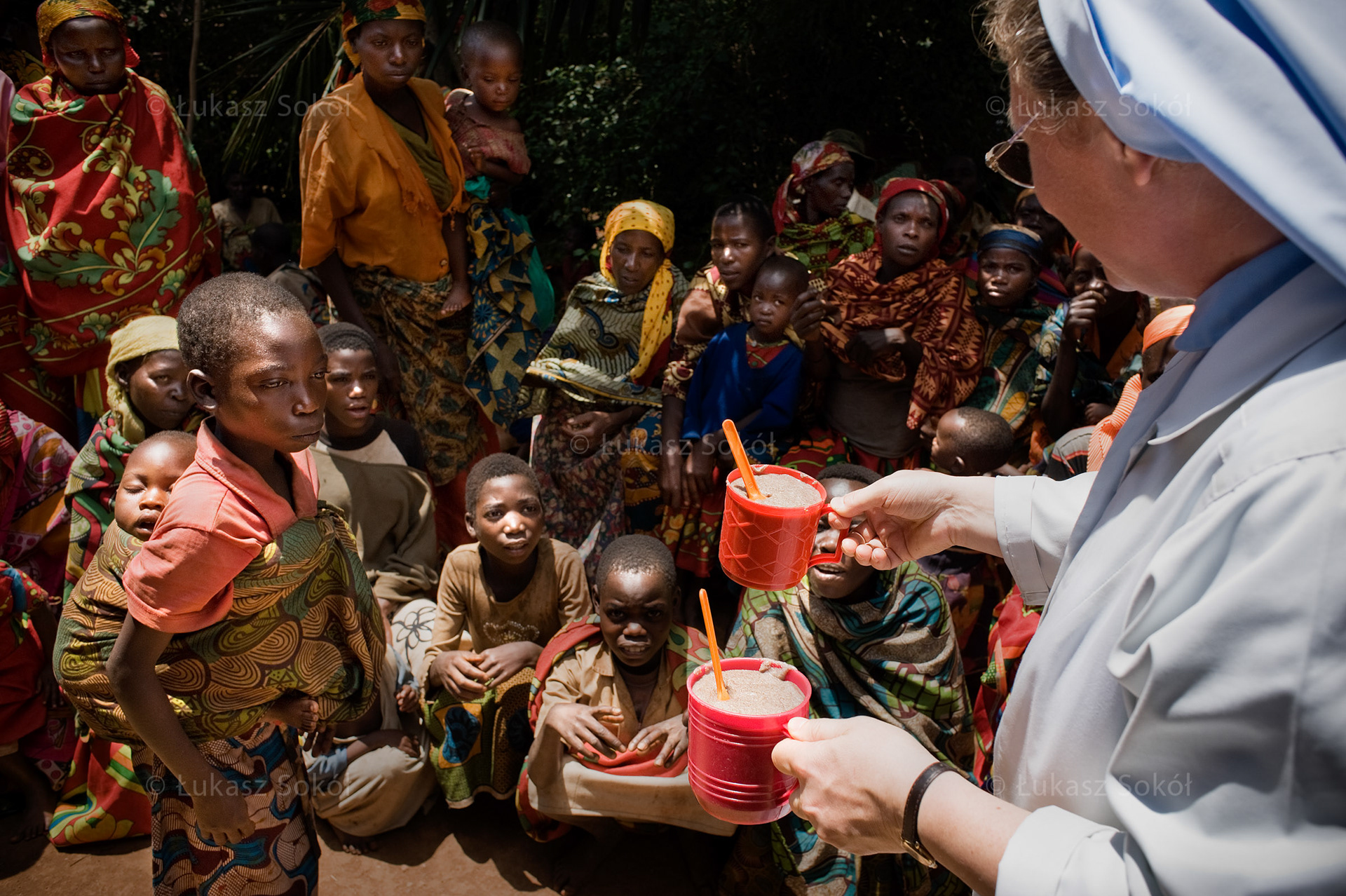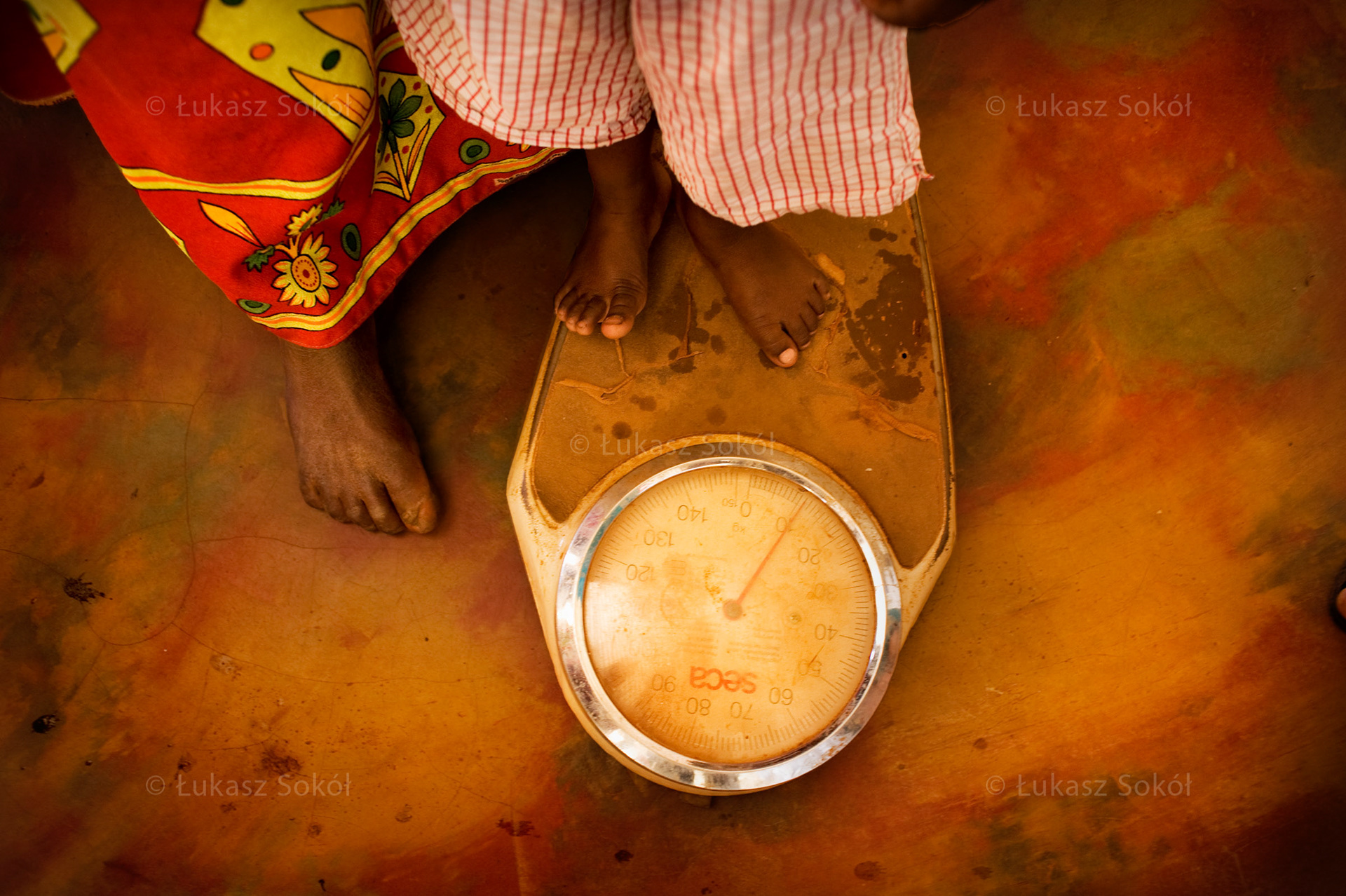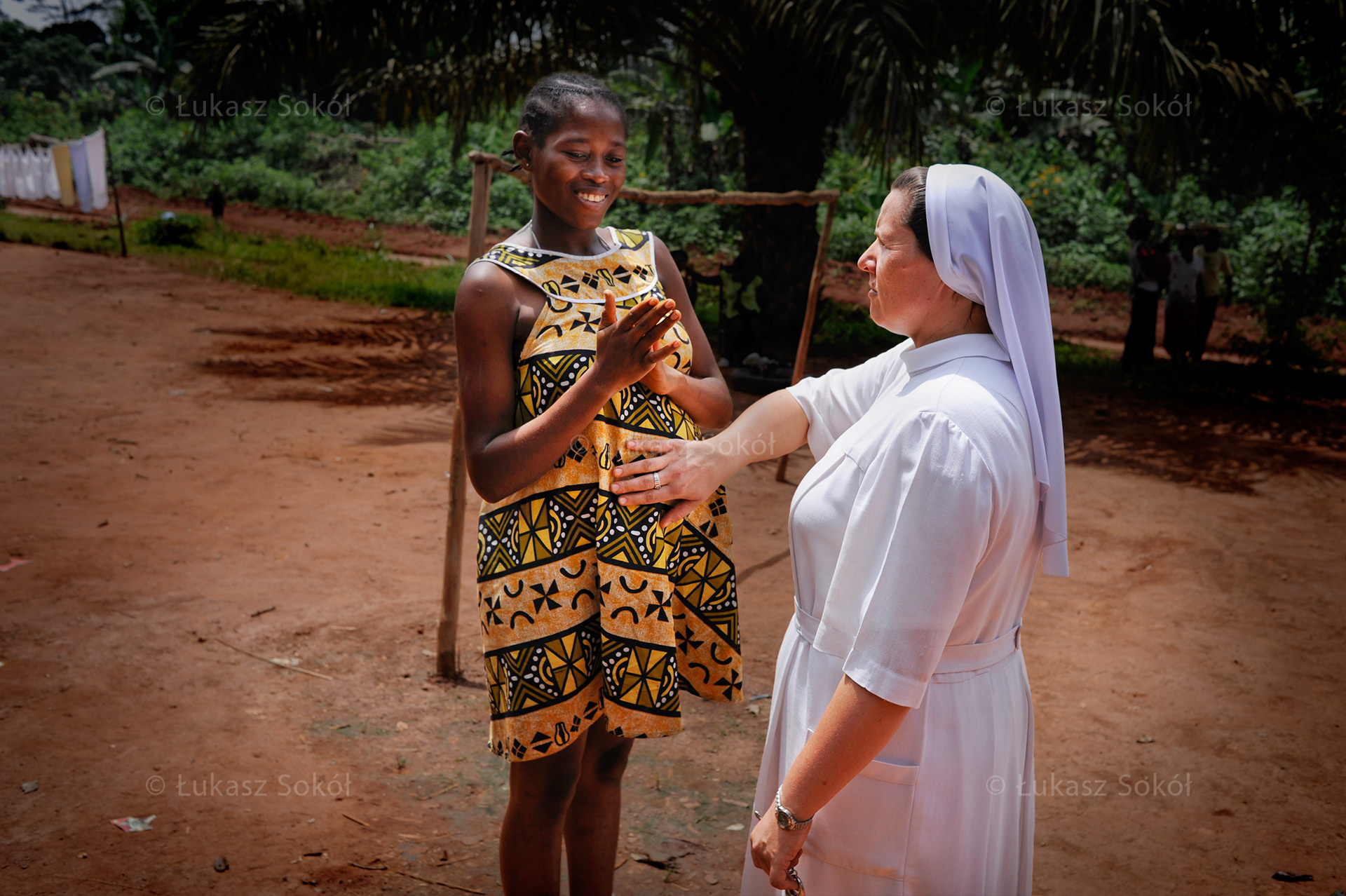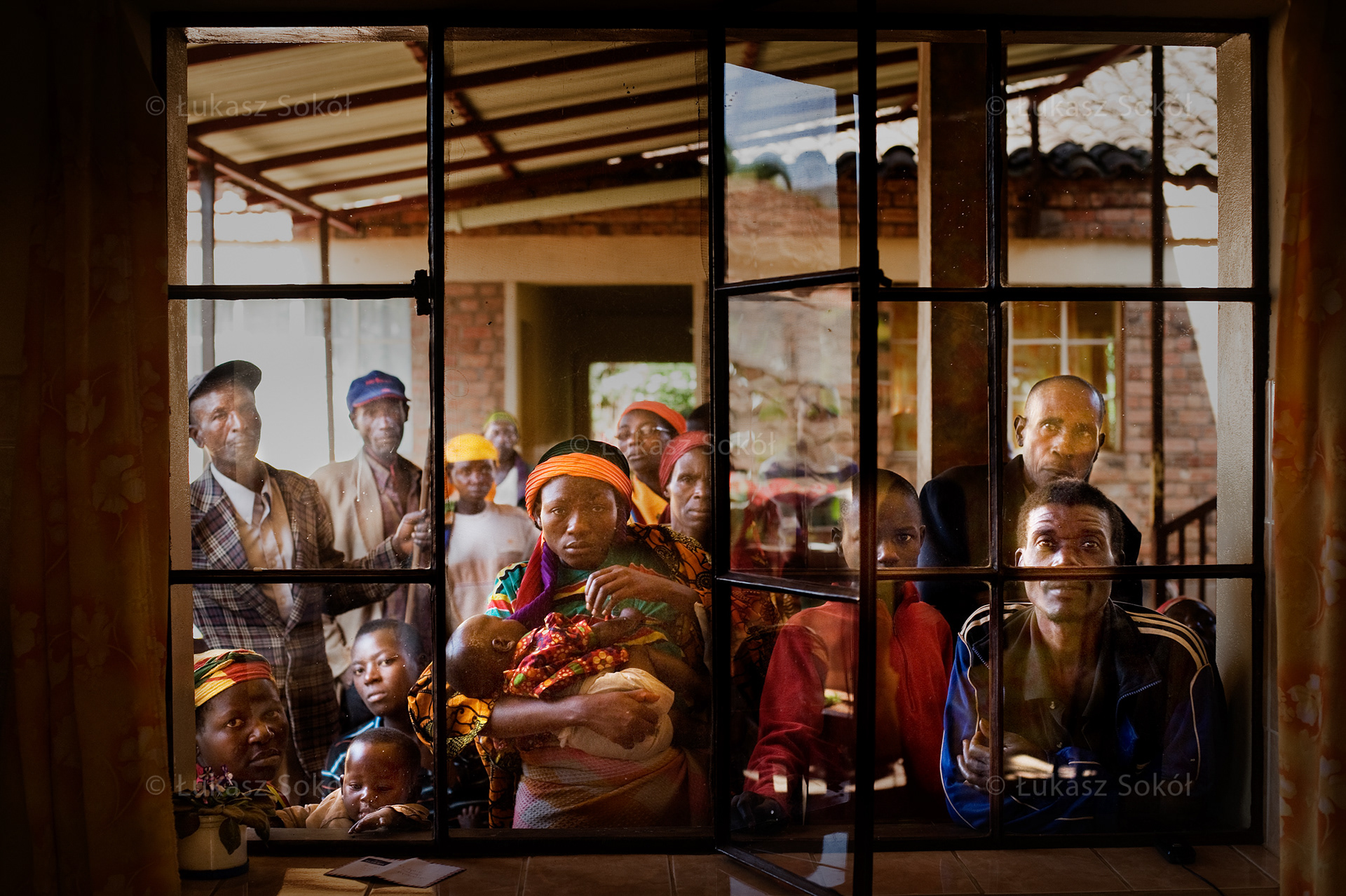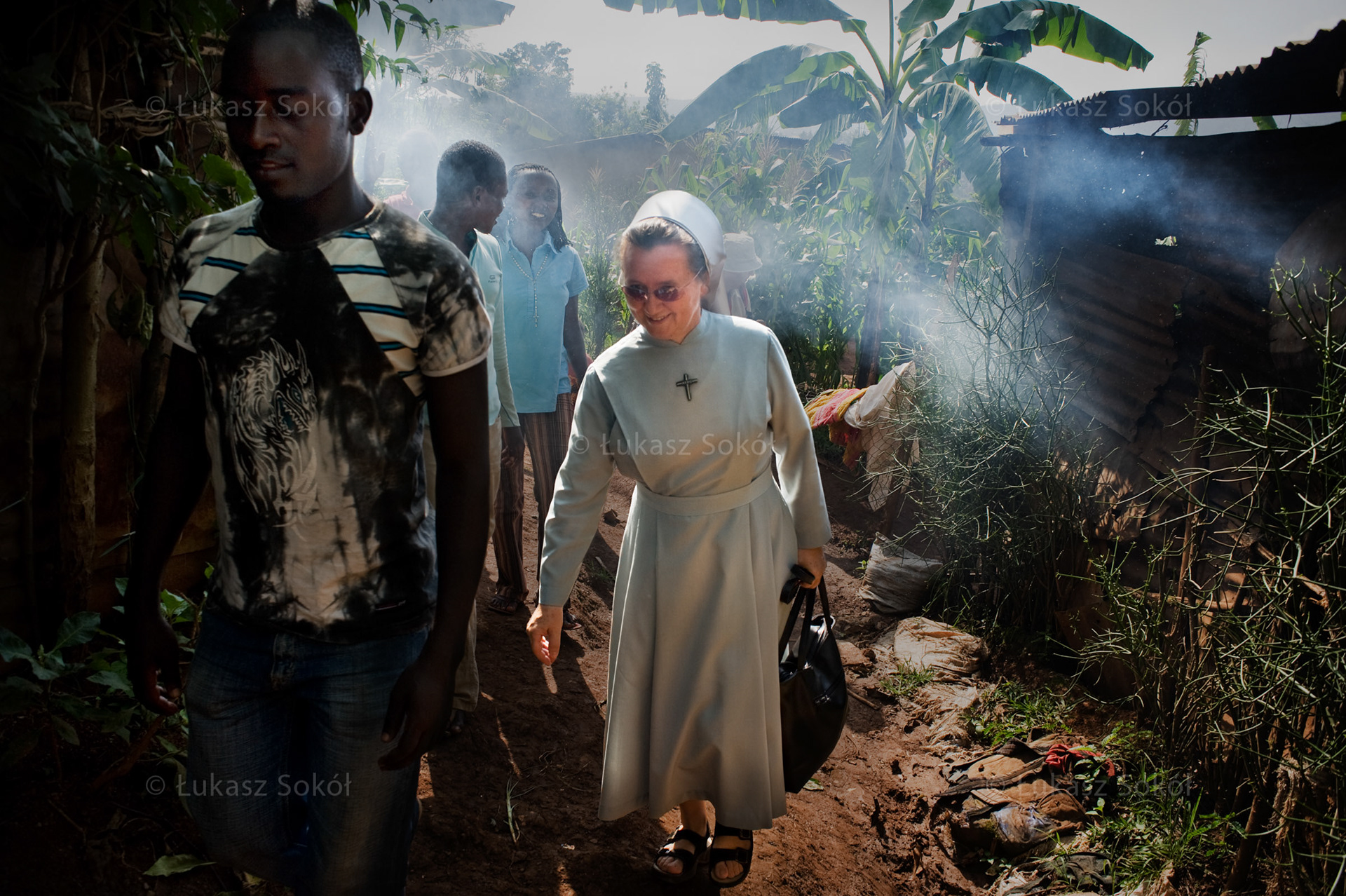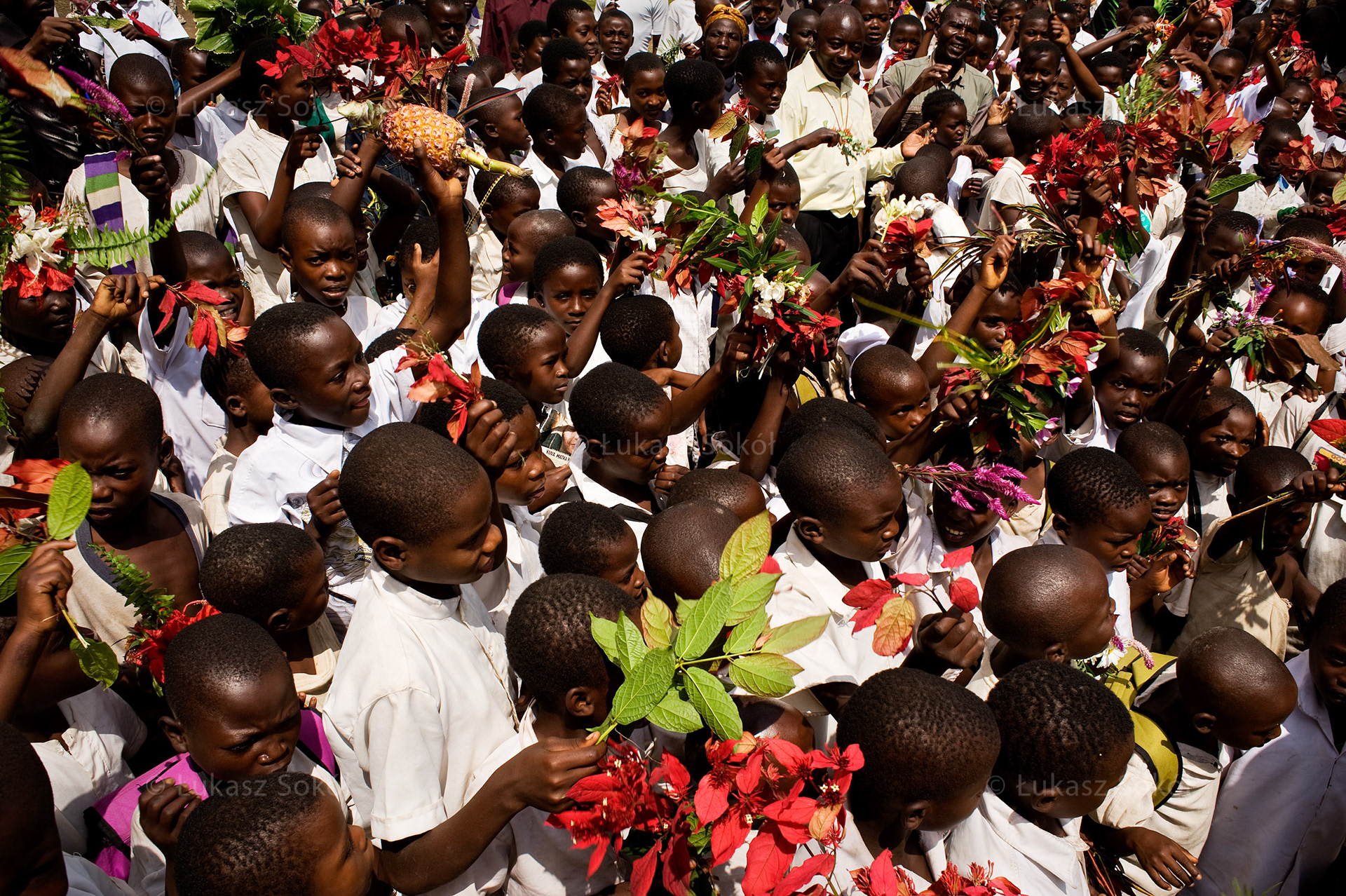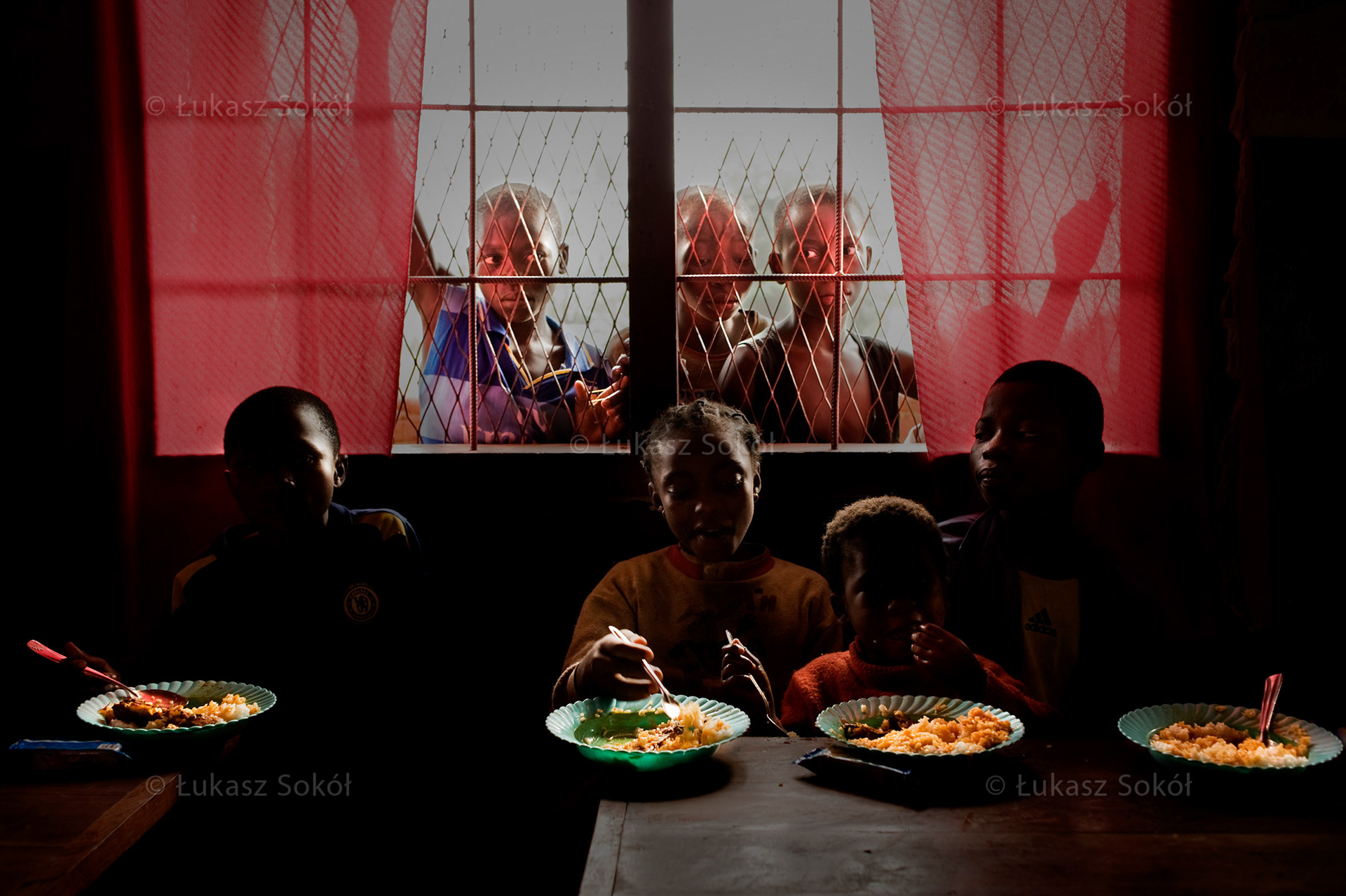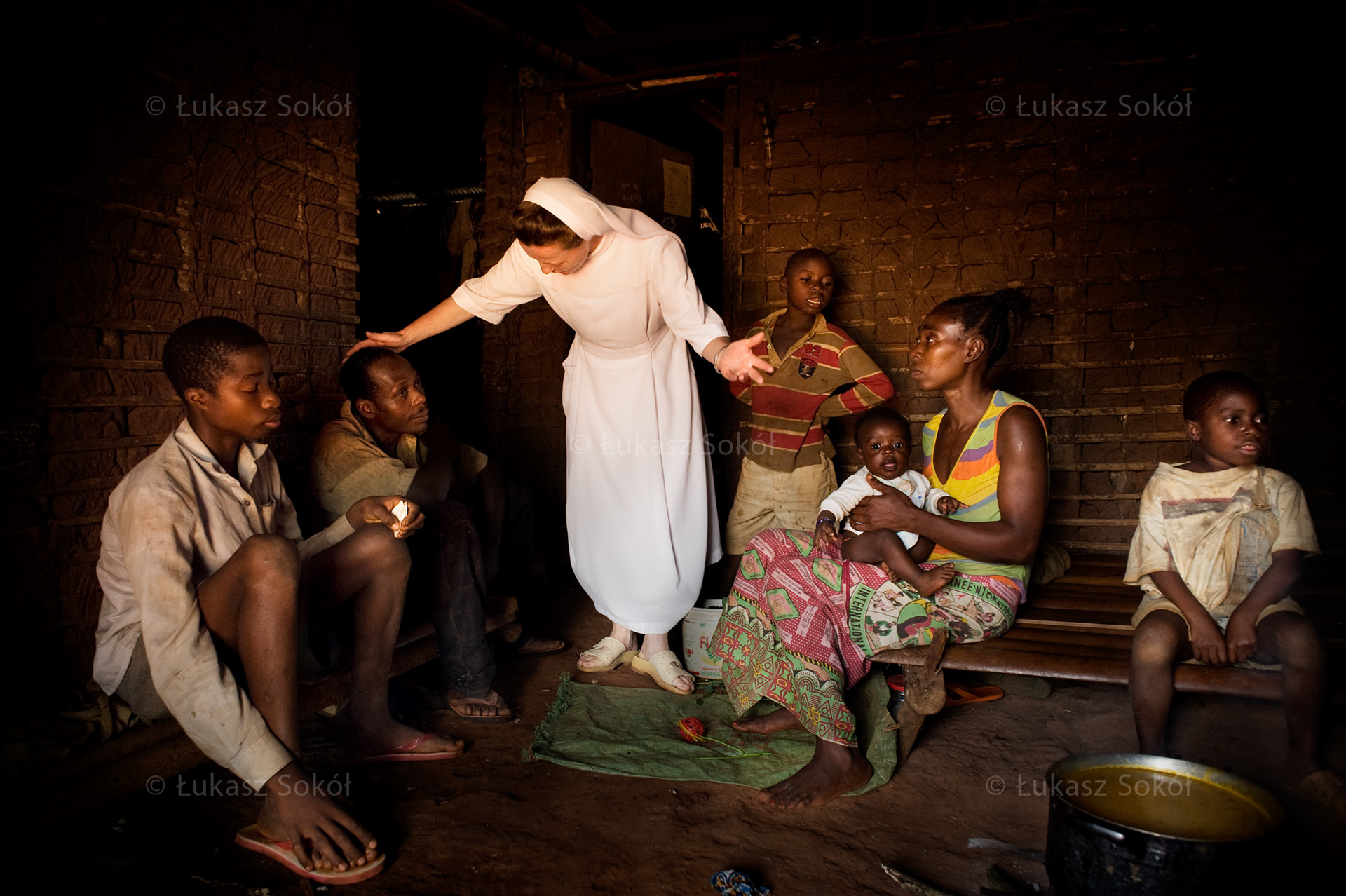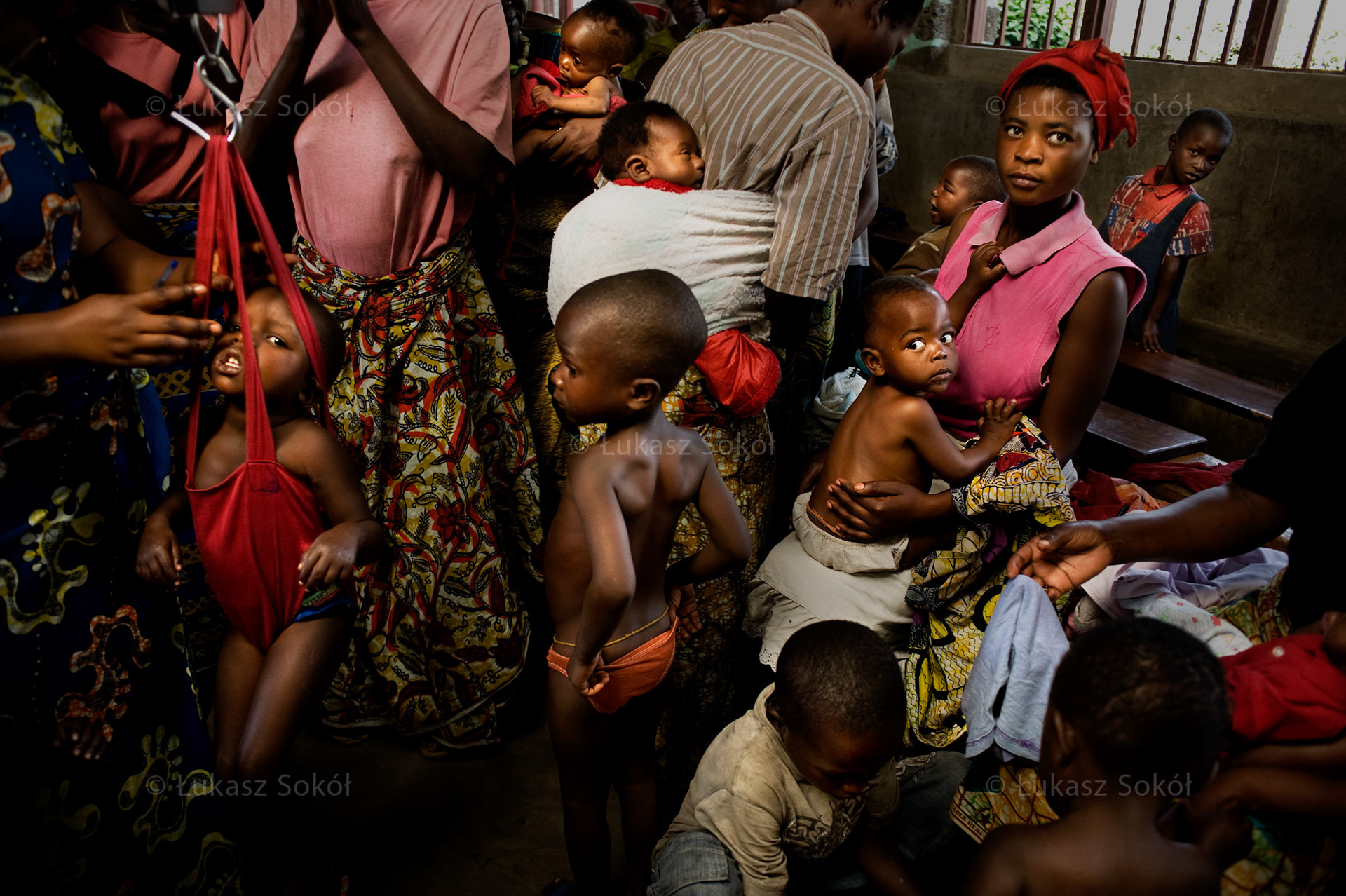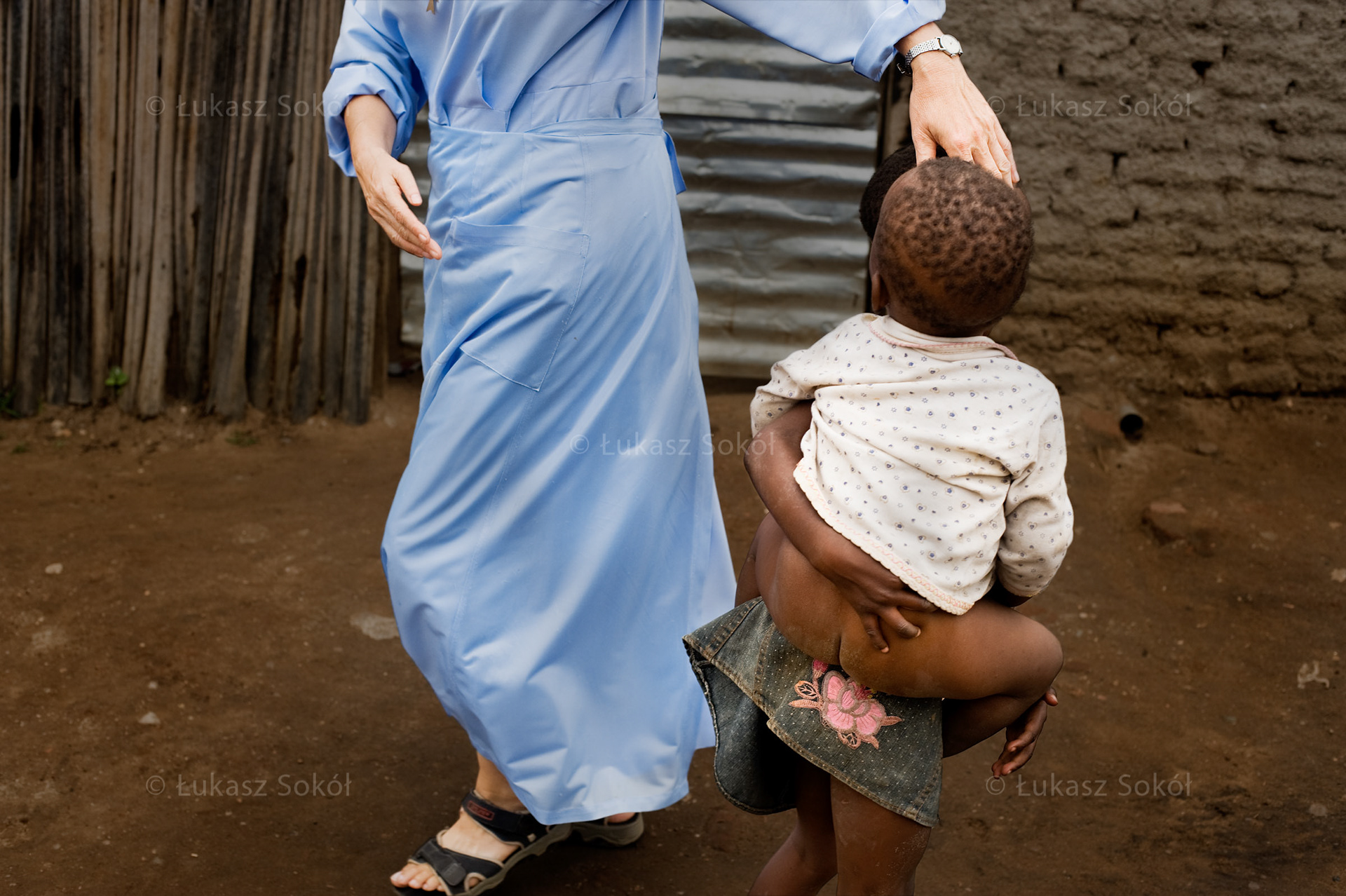
Children and youngsters from the village of Paki are unpacking plantains, which are, besides manioc, the basis of their monotonous diet, often leading to various diseases. The children are under the care of Pallotine sisters from the mission in Doume. Paki, Cameroon, 2009

Sister Nazariusza from the Congregation of the Most Holy Soul of Christ is talking to Cibo from Abong-Mbang in Cameroon, probably ill with AIDS. His family were not concerned about medical care for Cibo, his disease was not diagnosed. Cibo died a week after this photo was taken. Abong-Mbang, Cameroon, 2009

Women from Bertoua in Cameroon are making dinner. They are killing a hen next to a gravestone. Traditionally, the dead are buried near their homes. Bertoua, Cameroon, 2009

A lesson in a school in Essiengbot run by Sisters of Divine Providence. The education system in Cameroon is in a disastrous state, you have to pay for it. Parents often prefer children to spend their time working rather than to let them go to school. Even after six years of learning, pupils find it difficult to solve the easiest maths exercises such as additions and multiplications. Missionaries are children’s hope since they obtain funds for their education and care more about it than the parents. Essiengbot, Cameroon, 2009

Chindren from an orphanage run by Polish Dominican Father, Dariusz Godawa, in Bartoua–Mokolo in Cameroon, are having dinner: couscous from manioc and koko. Bertoua, Cameroon, 2009

A mother with a child ill with malaria in front of her house in the village of Buraniro. Burundi is one of the poorest countries in the world. Buraniro, Burundi, 2010

A mother with a malnourished child in the village of Mbege. Mbege, Cameroon, 2009

Missionaries from the congregation of the Canons of the Holy Spirit are visiting families under their care in one of the districts of the capital of Burundi. Bujumbura, Burundi, 2010

A kindergarden run by Sister Krystyna (Carmelite). The education system in Cameroon is in a disastrous state, you have to pay for it. Parents often prefer children to spend their time working rather than to let them go to school. Even after six years of learning, pupils find it difficult to solve the easiest maths exercises such as additions and multiplications. Missionaries are children’s hope since they obtain funds for their education and care more about it than the parents. Dimako, Cameroon, 2009

Every evening women from the Cameroon village of Ouama wash themselves at a spring hidden in a tropical forest. Men are not allowed. Ouama, Cameroon, 2009

Sister Regina from the Congregation of Sisters of Divine Providence during her visit in Essiengbot in Cameroon. She is there to see a new-born baby, the youngest villager. Essiengbot, Cameroon, 2009

Mission in Abong-Mbang (the Congregation of the Most Holy Soul of Christ). Marie Claire Linpo, aged 7, orphan, has 2 brothers (the older one serves a sentence in prison for killing his aunt) and a sister. He lives with 6 other orphans in a room rented for them by nuns. Abong-Mbang, Cameroon, 2009

A woman from the village of Ankoamb in Cameroon, with the skull of the gorilla which was once hunted. The village of Ankoamb is in the peripheries, it is regularly visited by Sister Nazariusza organizing help for children within the framework of the adoption by heart program, MAITRI – the Movement of Solidarity with the Poor from the Third World. Ankoamb, Cameroon, 2009

Children from Buraniro performing at the mission run by Polish missionaries – the Canons of the Holy Spirit. Buraniro, Burundi, 2010

A lepers colony (leprosarium) at the peripheries of Ayos in Cameroon. A woman cured from leprosy is selling makabo and palm nuts that she has grown. The woman lives in extreme poverty, she works on the fields with her granddaughter every day. Ayos, Cameroon, 2009

Children at a water spring in Djouth. In Cameroon children work very hard. Carrying water, preparing food, washing up, looking after younger siblings and washing are their basic chores. Djouth, Cameroon, 2009

Pallottines during one of their sparse moments of leisure by the lake of Kivu. Missionaries from Keshero have their hands full with work every day. They run a health centre, a supplementary nutrition centre for local people, they coordinate educational programs for children and young people. Keshero, The Democratic Republic of the Congo, 2010

Women are hanging the laundry in Routshuru, a village in the province of Nord Kivu, which has been affected by violent fights between guerrilla and the army for years. Rutshuru, The Democratic Republic of the Congo, 2010

In the Democratic Republic of Congo, as in other African countries, childcare is often the responsibility of slightly older siblings. Rutshuru, Democratic Republic of Congo, 2010

A secondary school student in his bedroom in Kigali, Rwanda, 2010.

Women with children in a supplementary nutrition centre run by Polish missionaries, Sisters of the Holy Angels in Ntamugenga. Supplementary nutrition takes place twice a week, mothers also get special nutrition blends to take home. A violent war between guerrilla and the state army has taken place for years in the province of Nord Kivu in The Democratic Republic of the Congo. Ordinary inhabitants are those who experience the consequences of the conflict most. The situation has improved recently and fewer women with children have been visiting supplementary nutrition centres. Ntamugenga, The Democratic Republic of the Congo, 2010

Sister Nazariusza from the Congregation of the Most Holy Soul of Christ is testing the scooter which is used, among others, to transport crops from the field by Mbege villagers in Cameroon. Scooters are often made by children only with the use of a machete. Mbege, Cameroon, 2009

A Pygmy preparing a field to grow makabo and manioc on the hills around Buraniro. Pygmies live here in very difficult conditions, outside villages, far from water, they cultivate stony land. They are unfairly considered to be the margin of society. Buraniro region, Burundi, 2010

A child being weighed in a health centre run by Polish missionaries, Sisters of the Holy Angels in Nyakinama. The weight of each child covered by the program in monitored regularly. Nyakinama, Rwanda, 2010

Women from the village of Essiengbot are combing their hair. In Cameroon women work harder than men. They cultivate the land, they carry wood and water and they look after the house. In fact, they do not have time for themselves, it happens that they come back to work on the fields right after the labour. They hardly ever find time for little pleasures such as a bath or other women’s company. Essiengbot, Cameroon, 2009

A sports tournament for children at the mission in Buraniro run by Polish missionaries – the Canons of the Holy Spirit. Buraniro, Burundi, 2010

Siostry Celestyna i Danuta ze Zgromadzenia Sióstr Opatrzności Bożej przyglądają się jak Sandrin (16 lat, stoi) i Denis (15 lat) z Ayos gotują obiad. Dziewczynki są objęte programem adopcji serca MAITRI i uczęszczają do szkoły życia.
Ayos to miasto łączące centrum i wschód Kamerunu, drugie pod względem zachorowań na AIDS. Na ulicach pracują dziewczynki od 13 roku życia, wiele z nich chodzi do szkoły.
Ayos, Kamerun, 2009

A catholic school run by Pallotine Sisters in Nkoum. The education system in Cameroon is in a disastrous state, you have to pay for it. Parents often prefer children to spend their time working rather than to let them go to school. Even after six years of learning, pupils find it difficult to solve the easiest maths exercises such as additions and multiplications. Missionaries are children’s hope since they obtain funds for their education and care more about it than the parents. Nkoum, Cameroon, 2009

Women from Abong-Mbang water the plants which they grow. People in Cameroon live for today, missionaries make an effort to teach them resourcefulness and thinking about the future. Some people in Cameroon, mainly women, learn new skills (e.g. sewing, cooking) in schools of life run by missionaries. Abong-Mbang, Cameroon, 2009

A seropositive mother is feeding children in a health centre in Doume in Cameroon run by Sister Mariette from the Pallotine Order. At some missions even 20% of children are born by seropositive mothers. Doume, Cameroon, 2009

A sister from the congregation of the Pallottines in a health centre in Masaka. Masaka, Rwanda, 2010

Malaria epidemic in Burundi. Distribution of malaria drugs in the health center run by Polish missionaries, the Sisters of the Canonesses of the Holy Spirit in the town of Gatara. Gatara, Burundi, 2010`

Every Sunday the churches of Burundi burst at the seams. Attending services full of singing and dancing is for most people, especially for women, the only moment of recreation and joy in their everyday lives, getting away from hard work and from looking after the house and children, a form of therapy for those who have experienced the consequences of the war taking place in the region for years. Buraniro, Burundi, 2010

Polish sisters from the congregation of the Canons of the Holy Spirit are distributing mugs with porridge to children and mothers who are covered by the supplementary nutrition program run by the missionaries and who visit a health centre in Buraniro twice a week Buraniro, Burundi, 2010

Ezechiela, a Polish sister from the congregation of the Canons of the Holy Spirit in a wedding dress rental in a tailor’s studio run by missionaries. The dresses come from voluntary gifts from Europeans. Thanks to them young inhabitants of Buraniro may look beautiful at their weddings. Buraniro, Burundi, 2010

A child being weighed in a health centre in Buraniro. Malnutrition is one of the most serious problems in the region. Buraniro, Burundi, 2010

Sister Gracjana from the Congregation of Sisters of Divine Providence is visiting Essiengbot village dwellers. In Cameroon even teenage girls give birth to children. Fertility is a proof of a woman’s attractiveness. A man gives money to future wife’s parents, and if a girl is fertile and has given birth to a child before, she is worth even more. Essiengbot, Cameroon, 2009

Malaria epidemic in Burundi. People waiting for a blood test for malaria at a health center run by Polish missionary Sisters of the Canonesses of the Holy Spirit in Buraniro. During the epidemic, the health center saw between 300 and 600 malaria patients per day. Buraniro, Burundi, 2010

Sister Marta of the Pallottine order visits children in one of Kigali’s districts. Rwanda, 2010.

Children helped by Polish missionaries - Pallottine Sisters. Rutshuru, Democratic Republic of Congo, 2010.

Feeding orphans and half-orphans takes place on Mondays and Thursdays in Betare–Oya – the oldest mission in the east of Cameroon (60 years) run by Michaelite Sisters at present. After weaning a baby, mothers neglect children’s diet which lacks vitamins and minerals. Children aged 1.5 - 2 have a very poor and monotonous diet consisting mainly of manioc which alleviates hunger but is deprived of nutrients. It leads to many diseases, developmental disorders and high death ratio. Betare–Oya, 2009

Sister Regina from the Congregation of Sisters of Divine Providence is visiting a numerous family. One of the children is covered by the adoption by heart program organized by MAITRI, the Movement of Solidarity with the Poor from the Third World and Polish missionaries in Cameroon. Essiengbot, Cameroon, 2009

Children being weighed in a supplementary nutrition centre run by Pallottine Sisters in Keshero. The weight of each child covered by the program in monitored regularly. Keshero, The Democratic Republic of the Congo, 22/01/2010

A Polish sister from the congregation of the Canons of the Holy Spirit is exchanging greetings with children in one of the poorest districts of Bujumbura, the capital of Burundi. Bujumbura, Burundi, 2010
